#superiority of Chinese system
Explore tagged Tumblr posts
Text
GAME OF THE YEAR
The best game that came out in 2024 was Nine Sols. I have a few theories as to why nobody is talking about this:
-It is a 2D metroidvania and takes pretty much all of its mechanical ideas from Hollow Knight, so it is not going to interest people who are into novel game design.
-It is horny, furry, Sonic and Daoist. Despite this philosophical standpoint's self-evident superiority when compared to the current system of the world (repressed Nintendo christianity) not everyone is ready to accept the new principles.
-It is full of unpleasant, potentially triggering body horror and does not end happily. I can discard this one because people seemed to enjoy Mouthwashing. More to the point, it is punishingly difficult, which requires more effort from the reader than the glorified visual novels that dominate the art game space these days.
-THE CHINESE COMMUNIST PARTY.
I will dismiss the first three points - devil's advocate nonsense - in favor of the fourth. Not a single streamer of note was brave enough to risk the wrath of the PRC by playing this brave, pro-indigenous video game, a game that loves the true cultural heritage of China, made in the only polity worthy of bearing that name. If you enjoyed Nine Sols this year and are not talking about it loudly and in public I name you coward.
--
Other games I enjoyed this year, irrespective of when they came out: Thank Goodness You're Here, Animal Well, Cult of the Lamb, endless replays of Disco Elysium, Shogun Showdown, Holocure, Vampire Survivors, Umineko: When They Cry, Dead Cells, Funeral Song for the Elemental Lords, XCOM and fucking Balatro.
83 notes
·
View notes
Text
In fact, far more Asian workers moved to the Americas in the 19th century to make sugar than to build the transcontinental railroad [...]. [T]housands of Chinese migrants were recruited to work [...] on Louisiana’s sugar plantations after the Civil War. [...] Recruited and reviled as "coolies," their presence in sugar production helped justify racial exclusion after the abolition of slavery.
In places where sugar cane is grown, such as Mauritius, Fiji, Hawaii, Guyana, Trinidad and Suriname, there is usually a sizable population of Asians who can trace their ancestry to India, China, Japan, Korea, the Philippines, Indonesia and elsewhere. They are descendants of sugar plantation workers, whose migration and labor embodied the limitations and contradictions of chattel slavery’s slow death in the 19th century. [...]
---
Mass consumption of sugar in industrializing Europe and North America rested on mass production of sugar by enslaved Africans in the colonies. The whip, the market, and the law institutionalized slavery across the Americas, including in the U.S. When the Haitian Revolution erupted in 1791 and Napoleon Bonaparte’s mission to reclaim Saint-Domingue, France’s most prized colony, failed, slaveholding regimes around the world grew alarmed. In response to a series of slave rebellions in its own sugar colonies, especially in Jamaica, the British Empire formally abolished slavery in the 1830s. British emancipation included a payment of £20 million to slave owners, an immense sum of money that British taxpayers made loan payments on until 2015.
Importing indentured labor from Asia emerged as a potential way to maintain the British Empire’s sugar plantation system.
In 1838 John Gladstone, father of future prime minister William E. Gladstone, arranged for the shipment of 396 South Asian workers, bound to five years of indentured labor, to his sugar estates in British Guiana. The experiment with “Gladstone coolies,” as those workers came to be known, inaugurated [...] “a new system of [...] [indentured servitude],” which would endure for nearly a century. [...]
---
Bonaparte [...] agreed to sell France's claims [...] to the U.S. [...] in 1803, in [...] the Louisiana Purchase. Plantation owners who escaped Saint-Domingue [Haiti] with their enslaved workers helped establish a booming sugar industry in southern Louisiana. On huge plantations surrounding New Orleans, home of the largest slave market in the antebellum South, sugar production took off in the first half of the 19th century. By 1853, Louisiana was producing nearly 25% of all exportable sugar in the world. [...] On the eve of the Civil War, Louisiana’s sugar industry was valued at US$200 million. More than half of that figure represented the valuation of the ownership of human beings – Black people who did the backbreaking labor [...]. By the war’s end, approximately $193 million of the sugar industry’s prewar value had vanished.
Desperate to regain power and authority after the war, Louisiana’s wealthiest planters studied and learned from their Caribbean counterparts. They, too, looked to Asian workers for their salvation, fantasizing that so-called “coolies” [...].
Thousands of Chinese workers landed in Louisiana between 1866 and 1870, recruited from the Caribbean, China and California. Bound to multiyear contracts, they symbolized Louisiana planters’ racial hope [...].
To great fanfare, Louisiana’s wealthiest planters spent thousands of dollars to recruit gangs of Chinese workers. When 140 Chinese laborers arrived on Millaudon plantation near New Orleans on July 4, 1870, at a cost of about $10,000 in recruitment fees, the New Orleans Times reported that they were “young, athletic, intelligent, sober and cleanly” and superior to “the vast majority of our African population.” [...] But [...] [w]hen they heard that other workers earned more, they demanded the same. When planters refused, they ran away. The Chinese recruits, the Planters’ Banner observed in 1871, were “fond of changing about, run away worse than [Black people], and … leave as soon as anybody offers them higher wages.”
When Congress debated excluding the Chinese from the United States in 1882, Rep. Horace F. Page of California argued that the United States could not allow the entry of “millions of cooly slaves and serfs.” That racial reasoning would justify a long series of anti-Asian laws and policies on immigration and naturalization for nearly a century.
---
All text above by: Moon-Ho Jung. "Making sugar, making 'coolies': Chinese laborers toiled alongside Black workers on 19th-century Louisiana plantations". The Conversation. 13 January 2022. [All bold emphasis and some paragraph breaks/contractions added by me.]
#abolition#tidalectics#caribbean#ecology#multispecies#imperial#colonial#plantation#landscape#indigenous#intimacies of four continents#geographic imaginaries#indigenous pedagogies#black methodologies
466 notes
·
View notes
Note
I love and think about Emperor Jing Yuan a lot. Like a servant girl getting called in to be the emperor Jing Yuan's Concubine 😋
I love ancient China like the history, art and clothing. when I think about Chinese Emperor Jing Yuan I think of Cinderella Chef (animated version) it's so cute and romantic. I also think about the fic series I used to read in 2020 or 2019 when the reader is the selected tailor for the emperor and the emperor falls in love.
It was such a good story, with many good different story elements to it even though it's was an yandere x reader 😭 and I'm not even exaggerating how good it is. It was slow burn yandere yet sooo good and worth it
I have to read it again cause it's sooo good.
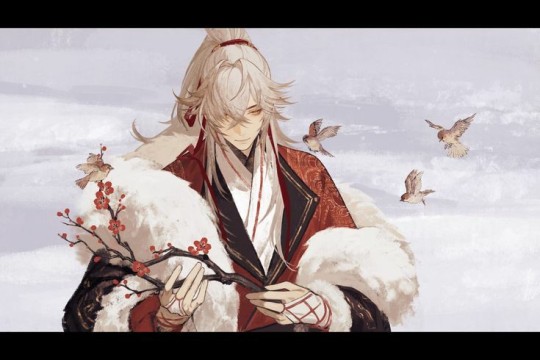
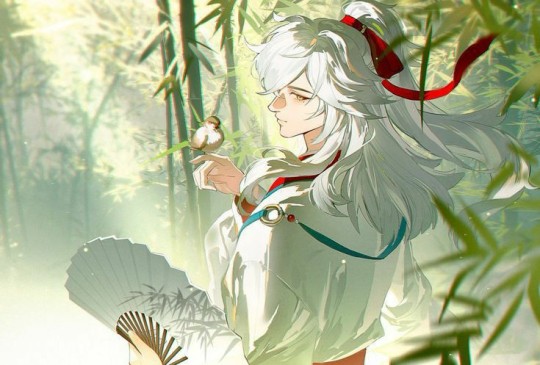
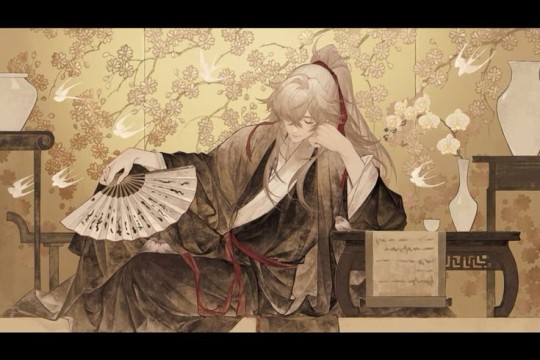
There's sooo many good art of Jing Yuan in ancient Chinese clothing and I love and appreciate it sm 🤤
Jing Yuan kept a servant girl as his concubine, wanting her by his side every moment. As emperor, he faced countless threats and worried constantly for her safety. Yet, he couldn’t resist making her his bride, even though the public and his family disapproved. How could a servant girl from a humble background become empress alongside the emperor? But he paid no attention to their criticisms, choosing instead to live in his Fantasies with her. She was the only woman he’d ever met who cared for him beyond his wealth and title, and he was determined to keep her close forever. 😇
Wow, I also like Chinese palace stories actually!! What you said made me imagine a lot. It turns out that Jing Yuan is so suitable for the palace AU🥰✊
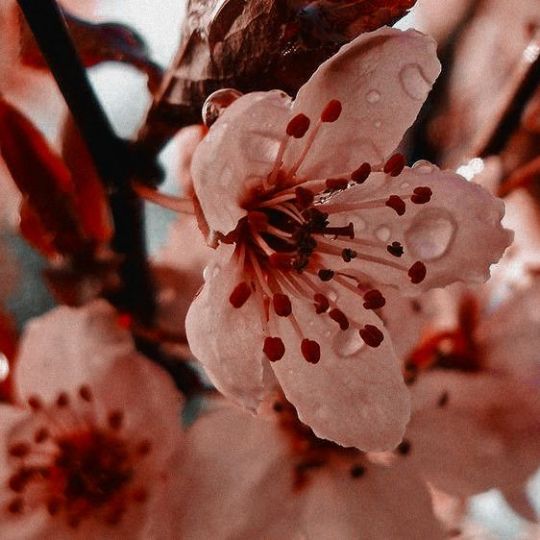

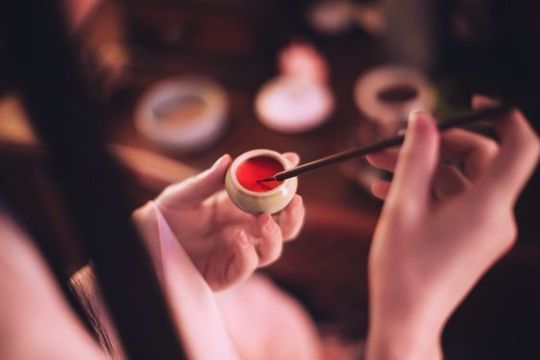
Have you watched "Story of Yanxi Palace"? It was a popular palace drama in 2018, and social media was all about it at that time. The historical prototype of the female protagonist is Empress Xiaoyichun (孝儀純皇后). She first started as a concubine. During her lifetime, she was the "Imperial Noble Consort" (皇貴妃), which was the highest position among the concubines after Empress. The core of its story is about a confident servant woman who starts from the bottom and moves up through the ranks with wisdom and courage.
A negative example is "Ruyi's royal love in the palace". The show still gets a lot of negative criticism in China today (yes, that's happening in 2024) - for its slut-shaming and superiority theories. The lower class people must be loyal to the noble people, otherwise they will be severely punished. There are a lot of torture scenes of women, never criticizing the mistakes of the misogynistic system, vilifying all historical figures just to beautify the female protagonists, advocating that women must be loyal to one man throughout their lives or else they are sluts, vilifying and torturing ambitious women, etc.
Oh, I'm sorry I really hate that TV show so I'm talking too much about it, but to get back to the point, it occurred to me that if Jing Yuan were the emperor, he would be very - very infatuated and dedicated. There was an emperor in Chinese history called "Emperor Xiaozong of Ming"(明孝宗) who insisted on living a monogamous life with only one empress. The same is true for Jing Yuan! Jing Yuan has only married you from beginning to end! You are one of his servants. No matter what your personality is, witty and lively/shy and kind, or even arrogant, Jing Yuan finds you really cute🥰💖He is very happy that you entered the palace and were assigned to serve him. He will sometimes sleep on your lap and ask you to feed him. He was like a big sleeping lion. But no one in politics dares to underestimate Jing Yuan because he always predicts everything.
Jing Yuan built a fruit garden in the palace, as well as a place to raise cats and birds. He got to pet cute cats and birds every day. The kittens purred around him. Maybe you were the servant who took care of the cats here. And he discovered you💖You are so suitable to be the mother of cats. And maybe he's hiding his identity and you care about his health and happiness before his status.
Politics and the harem are closely related. Those ministers petitioned Jing Yuan to marry a girl who matched his status, but he would not marry any girl except you. This is his own business! There was an emperor named "Emperor Gaozong of Tang"(唐高宗) in Chinese history. Despite the objections of his ministers, he insisted on marrying his father's concubine (named "Wuzhao"- 武曌) as his queen and sharing power with her. This is a very real love among emperors! After her husband's death, the queen became the only female emperor of China. The expression of the emperor's love for someone is to give them the best at all costs, including power, fame, wealth, and status. Jing Yuan wants to give it to you. He married you. Based on your status as a maid, you start as a concubine but work your way up. And he will also give birth to kitty babies with you. Those little princesses and princes running happily are all of your blood and his.
And he also decided to discuss politics and decide national affairs with you, collectively called "two saints" (based on Wuzhao's history haha), and share power with you. Because he knows how smart and cute you are, able to sharpen your claws and handle government affairs💖He is also ready to build a royal mausoleum, where only the two of you are buried together (it may be a bit scary, but this is how the Chinese emperors express their love haha). Even after Wuzhao became the empress, she didn’t build a mausoleum independently because she loved her husband. No matter what, you are always together, with sweetness and honor forever💖
131 notes
·
View notes
Text
Rebelling Against Colonialism: Utilising Les Misérables as a Political Statement
To cheerily start things off, France colonised Vietnam from 1858 until 1885. The French colonial forces imposed colonial beliefs in their political and social order, including the hierarchy of languages (that the language and culture of France was superior and that Vietnamese culture and language was inferior and in need of being eliminated) among other colonial-typical changes.
I have talked about Hồ Biểu Chánh and Nguyễn Văn Vĩnh's works before in regards to Les Misérables, but what I failed to do was address its political stance achieved by the act of translation and adaptation.
When the translation by Nguyễn Văn Vĩnh came out in 1926, the Vietnamese heavily resonated with many themes discussed in Les Misérables, such as the themes of the poor, the oppressed, and the fight for freedom and justice.
While on the surface this may look like self-subordination as they translate a French work to represent their unfortunate aftermath from colonisation, researcher Tess Do (whom most of the post would be referring to her research paper) argues that the translation was an act of post-colonial resistance which challenges the power struggle, and of which tries to flip it.
Nguyễn Văn Vĩnh (1882–1936)
One of the significant colonial tactics to make the masses 'favour' the oppressor (the French), was to implement francisation of Vietnam. This was achieved by creating pro-France indigenous elites, pro colonial reforms, pro-France education system, and changing the national language ('encouraging' transitional bilingualism).
This act of transitional bilingualism by the French is regarded as linguistic and cultural genocide. Before and during this period in time, most of the Vietnamese population was illiterate and their writing system was largely based off of the Hán Chinese classic texts.
With the severity of the past established, Tess Do argues that Nguyễn Văn Vĩnh's translation does not adhere to the unbalanced relationship of colonised translations due to his version of Les Misérables being written in Quốc-ngữ.
Bringing in the context discussed above, the usage of Quốc-ngữ can easily be recognised as an act of rebellion, as the French belittled Quốc-ngữ's existence by believing the script to be so lacking that it could not be used to convey abstract or scientific thoughts.
Often translations can be seen as the original holding power, while the copy is disempowered. However Tess Do argues that, by using the indigenous language, Nguyễn Văn Vĩnh was writing in rebellion, and by doing so, refused to let Quốc-ngữ be interpreted as inferior by any standard.
Furthermore, Nguyễn Văn Vĩnh was among the first scholars to use the script as a way of bridging the divide of the East and the West- translating the ideas to the indigenous language rather than enforcing the people to learn the Western languages.
He pushed Quốc-ngữ into a national script.
Not to mention, he also translated Vietnamese classics into French in order to help both sides understand the artistry of the other.
Hồ Biểu Chánh (1884–1958)
Hồ Biểu Chánh's Blades of Grass in the Wind (adapted from Les Misérables) is an adaptation made to 'imitate': a way of art which not only changes the 'reality' of the source material, but also the authorship of the text.

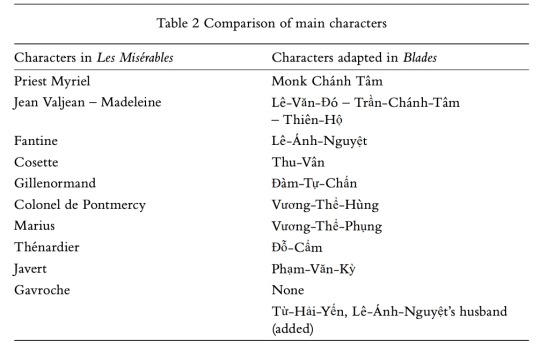
Do (2017), p. 120, 121.
When we consider these types of changes outside of the context in which they were written, we could just easily conclude that these changes were made in order for the audience to understand the original material on a deeper level. However, Tess Do argues that, given the historical context of forced assimilation, these types of changes were a symbolic resistance against the French cultural aggression.
A monk being the moral voice, Jean Valjean and Fantine's counterparts being the most Confucianist out of all the significant characters; all are powerful in its message and presence as we consider the time frame of it being written in the aftermath of the French colonial policies limiting or attempting to rid of dominant religions in Vietnam.
The lessons on morality thus becomes about the five essential Confucianist virtues: humanness, righteousness, respect, understanding, and integrity.
Although there were many brave scholars who called for an uprising against the French colonial rule, Hồ Biểu Chánh stated that he explicitly did not write any suggestion of political reform, and instead focused on cultural resistance, in which Do argues could very well be the reason why this adaptation/story of Blades of Grass in the Wind is still popular today.
As a testament to the longevity of its theme and cultural resistance, references to Hugo or Les Misérables have been sieved out in subsequent adaptations, as if Hồ Biểu Chánh's adaptation was a birth of something new.
Often there may be over-focus on which translation is the 'truest' in the sense of the most accurate semantics of the words written in the original. And while this search is admirable, great, and absolutely necessarily in the studies of literature and linguistics and history and all that is beyond, sometimes I do wish works like these- effects like these- can also have its fair share of light shone on.
How remarkable is it that, by changing the original source, it brought life to many of themes discussed into a new population? Ironic, that by changing details from the original source that it made it more accurate to the representation of the themes and applicable to another set of audience, whereas a 'true translation' would've not resonated as much?
To finish off this summary, I would like to point out that Victor Hugo was indeed a colonialist-sympathiser (as he did believe France would 'civilise' countries in the act of colonialism), and so learning about how a colonised country (by France no less) would go about translating and adapting his work gave me a new sense of appreciation of both art and cultural resistance that I had never considered before.
I have long promised I would cover Vietnam on my list of observations (among many other countries in waiting, I know), but I hope you enjoyed reading this as much as I had reading about this topic.
And in the case this post doesn't do well in terms of reach, I hope that in the future, people looking for specific subjects stumble onto this post- or even better: the article I'm going to reference!
I would love to talk about Vietnam once more one day, and hopefully encounter many insightful articles from scholars and researchers and from the general audiences as well. Until then, this is it so far.
Reference: Do, T. (2017) 'From author to saint: the appropriations of Victor Hugo and Les Misérables in colonial Vietnam', Contemporary French Civilization, 42(1), pp. 113–129
#les mis#Vietnam#Vietnamese#Nguyễn Văn Vĩnh#translations#adaptations#Hồ Biểu Chánh#politics#Ngọn Cỏ Gió Đùa (1926 novel)#colonialism#french colonisation
50 notes
·
View notes
Note
Hi hi, so I read your post about Ao Bing and , so his job is to get offended because someone was born on certain dates (?) he wakes up one day and says "Oh, this person has offended me, so I'll give you bad luck?" 😨
It is still pretty messed-up by modern standards, but "offend" isn't nearly as personal as the translation implies.
In traditional Chinese astrology, it just means that certain combination of the Heavenly Branch and Earthly Stems on the date + hour of your birth is categorized as a Shensha star.
Depending on where said combination appears, and its relation to other Shensha combinations, it can be a good or bad thing for the people born under it, and when it's a bad thing, "offend" is often used.
But, to use an analogy: oftentimes, it's more like "You are born a Gemini and therefore [insert good or negative qualities]." When the astrology sign is associated with certain undesirable qualities, it isn't bc the constellation of Gemini is literally mad at you.
(I don't actually believe in any system of astrology, I just find the cultural context fascinating.)
Apart from the "bad luck to parents" aspect of Huagai, according to 三命通会, Huagai is more of a star of loneliness. People with that particular combination tend to be pretty solitary, even if they are born with wealth and power, and tend to become monks/priests or artists.
This "lonely" association also means being orphaned, widowed, not being the oldest heir, or being given up to another heirless family for adoption.
To use a bit of creative interpretation: it's less he wakes up one day and goes "You offend me and I'll give you bad luck" (that's more like the traditional characterization of the Taisui Star).
Rather, he's probably just doing paperwork, writing down the names of everyone whose Bazi falls under his influence, mapping out which particular way that influence will manifest and leaving his own suggestions, before handing the list to his colleagues and superiors in the Dipper Mansion.
And maybe also being JE's royal umbrella carrier while he was at it.
28 notes
·
View notes
Text
SJ and the Pitfalls of Toxic Masculinity
Liking women wasn’t shameful in the least, but treating a woman as your savior, shrinking into her embrace in search of self-confidence—Shen Qingqiu needed no one to tell him how incredibly shameful that was. So he would rather die than tell anyone, particularly not Yue Qingyuan.
- Yue Qingyuan and Shen Qingqiu Extra
Hot take: og!SQQ had toxic ideas about masculinity, and it ruined him.
SVSSS is all about the ✨Toxic Masculinity✨ but this seems to be more associated with SY than SJ??? So yeah, lets talk about SJ (my poor meow meow).
There’s actually some subtlety here, because talking about SJ and masculinity naturally involves an interplay between historical and modern views on masculinity in China, which is something that has developed over time and has influences from other cultures (e.g. the west and our views on masculinity). (Interesting thing if you haven't already come across it) I am… not qualified to read the subtleties here.
To note, SJ is coded as masculine… sort of. He’s the head of the scholarly peak, a master of the Four Arts, which is one facet of ideal masculinity in traditional Chinese values. (Fluttering a fan around was very gentleman-like. Although also, expressing your emotions through poetry and copious amounts of tears was very masculine back in the day. 'Traditional masculinity' has and always will be an elusive ideal.) But I get the feeling nowadays ‘scholarly’ has more feminine connotations than ‘martial’, albeit a slightly weaker one than in the west. Also, on the topic of toxic masculinity, certain groups of people Who Shall Not Be Named would like you to believe that Real Chinese Men are stoic warriors and ‘gayness is a western thing’ (my rage is unreal but we will not talk about that).
Anyway, broad strokes, broad strokes.
Arrogance and Insecurity
A big part of toxic masculinity is a need for social recognition, to be the ‘alpha male’ (not an ABO pun and on a side note I literally cannot take anyone talking about alpha males seriously now, for many reasons, but this is the funniest).
SJ is obsessed with his cultivation, but more pertinently, he is obsessed with his reputation. He demonstrates this in a few ways. Firstly, he works his ass off, which is not bad in itself, but he does this to the extent it is detrimental to his health (that grindset lol). Secondly, he projects a certain image with his actions and mannerisms: reading in order to seem intelligent, looking down at people to seem superior etc. Thirdly, he responds to any perceived slights of his ability with violence. (Fighting with LQG is an example, but also drawing a sword on SQH when he pointed out that he was reading an upside-down book.)
Now interestingly, the unanimous vibe that Cang Qiong seem to get from SQQ is that he is ‘arrogant’. When in truth, all of this is compensating for his insecurity.
Shen Qingqiu was overly suspicious, always feeling as if everyone was talking behind his back about how he was still incapable of forming a core, didn’t accept his position, wanted to sabotage him in secret, and so on and so forth.
- Yue Qingyuan and Shen Qingqiu Extra
Sadly, SJ is justified in being afraid of other people’s opinion. His comfort and security rely entirely on his status, which in turn rely on other people’s opinion of his competence. Of course he wants to get to the top – he’s been under other people’s power before, and suffered terribly as a result. Why should he not desperately defend what he has worked so hard for? Yet ultimately it works against him, because when he’s in serious trouble, he hasn’t been able to build the human connections he needs to get help.
The problem is with the system. The idea that having strength allows you to do whatever you want hurts not only the people regarded as inferior, but also creates a collective sense of anxiety for those who find themselves ‘at the top’. Anyone can be kicked down and treated like scum. Everyone is afraid.
Dominance and Bullying
The phrase ‘toxic masculinity is fragile’ quite often, but to elaborate, these kinds of rigid ideas of masculinity are by nature constantly under threat. Because any crack in the perfect shell is regarded as failure, it requires constant, aggressive maintenance, which takes the form of bullying the weak in order to elevate oneself.
SJ’s treatment of LBH is complicated, but here I want to draw attention to a different character – Ming Fan.
SQQ (SY) would have you know that MF is not a bad kid, other than the fact he’s a huge bully to LBH. And in part that comes from jealousy of NYY’s crush on him, but what allows it to happen is the way SJ runs the peak. It's interesting to note that so much of SJ's bullying of LBH happens through MF, whether it be giving him the faulty cultivation manual, giving him chores or physically assaulting him. In doing this, SJ creates a system that firmly establishes himself at the top, likely in order to give himself some semblance of security.
But ironically, this is the very system that SJ has suffered under his entire life, recreated to it's extreme on the peak that he controls. When he was completely under the power of others (QJL, LBH) he suffered. When other people were under his power, he inflicted suffering. He encouraged other people to do the same. Again, the whole thing is a scam! He is putting all of his energy into things that aren't helping him, things that ultimately bring him down.
Real Men Don’t Cry – the Dangers of Emotional Repression
SJ has many, very justifiable reasons in life to be upset and angry. The things he went through are both terrible and extremely unfair. Being angry at everything is not a healthy outlet for these feelings, but he hasn’t exactly been taught an alternative either. On the streets, tears would have gotten him absolutely nothing. Anger at least gave him energy to fight back.
And this destroys him. He is angry at the fact he had no one in his life who loved him, his talents were wasted because of QJL/WYZ, nobody takes his abilities seriously… and with no healthy way of expressing this, he goes onto bully LBH. LBH then returns to destroy him, literally. More subtly, he is unable to express his fear and anxiety in healthy ways, so acts standoff-ish and aggressive to his those around him. As his relationship with them deteriorates, his fear and anxiety increases. Feedback loops.
SJ puts on a mask of anger and stoicism to the point that everyone around him (including himself) is convinced that he is unrepentant and evil. Suppresses and suppresses until it breaks him, until he has nothing – not his comfort, nor status, nor the one that he truly cared for:
He had single-handedly facilitated Luo Binghe’s today, and now who had single-handedly created this outcome for him? Yue Qingyuan was never supposed to have an end like this. In order to come to a decades-late appointment, to fulfill a completely useless promise. A broken sword and a dead man. It shouldn’t be like this.
A Note on Ambivalent Sexism
It’s funny because I think there’s a fandom vibe that SJ was the secret feminist of SVSSS. Don’t get me wrong, I love this in fanfics. Badass feminist SJ all the way. But my honest opinion is that I don’t think that was the case.
More explicitly, I don’t think SJ took women seriously. NYY, for example. Certainly, SJ valued NYY. But the expression of this care involved doting on her, hiding his treatment of LBH from her, and not particularly pushing her to grow. And PIDW!NYY wasn’t implied to be the most mature of the lot. Okay, while we don’t know a lot about PIDW!NYY (narrator unreliable), it’s probably safe to say some distance from SJ helped her a lot.
Another point – the Qiu massacre. SJ killed the men, but not the women. And while this says more about his distaste for men, it also indicates (possibly - I will float this idea but I won't die on this hill) that he straight up doesn’t see any woman as an enemy, or capable of being a threat. Which is possibly a natural conclusion he’s drawn from his experiences (QHT was not very perceptive, or very threatening) but also inaccurate as a worldview.
And his attitude towards the women he sees as saviours? Has the same vibe as ‘it’s so embarrassing to be protected by a girl’.
Okay, so being doted on and not being killed are positives compared to being abused or murdered, but this kind of attitude is the opposite side of the same coin to ‘women are incompetent and inferior’. And when it comes to raising kids, not allowing them to grow can be extremely harmful as well. See e.g. Ambivalent sexism.
Although I do want to mention that I do not think SJ was like… actively misogynistic. I think he genuinely liked women more than men. The point is you can be sexist without realising it.
Conclusions
To conclude, SJ had ideas of success and self-worth associated with toxic masculinity which were instrumental in his downfall.
Masculinity doesn’t have to be toxic. While the Cang Qiong family aren’t exactly the healthiest bunch, YQY’s calm and patient leadership, LQG’s steadfast loyalty, LBH’s ability to cry like a maiden and still be the strongest… these are all traditionally masculine traits that can be very positive. These are also people who can have feminine traits and explore their gender identity without being prissy or weak.
It's the great tragedy of SJ that he had many positive characteristics. He was talented, intelligent, articulate, perceptive, loyal, and caring… under the right circumstances, he could have grown into a great person.
And maybe he still had that chance, right until the end.
#svsss#shen jiu#original shen qingqiu#svsss meta#having said i would disappear i have things to dislodge from my drafts
273 notes
·
View notes
Text
A random analysis of the Japanese subs.

This post is so, so self-indulgent, but I hope it'll be fun.
The reason I am making this is simple: I am a linguistics major, I like Dofus and Wakfu, and I really like the way the Japanese language allows one to express themselves by using pronouns and honorifics, both for oneself and others.
It's always fascinating to see what can be said about characters through their usage of Japanese language: both in translations, and in original texts. I'm sure you've heard about the Japanese translation of Undertale, and for a good reason.
...Just like every other post on my blog, this will only be about Kerubim, Atcham, and Joris. But this time, not just because I am so hyperfocused:
Our main sources for Japanese translations of Wakfu are fan subs (hard to find), the lost media dub that has been wiped from the internet (impossible to find), and the official Netflix subs. I do not have Netflix, so I had to employ @dullard's help in this endeavour... except Dullard doesn't know any Japanese, and since Netflix is very anti-piracy, we couldn't screenshare it, which means he had no help from me. It made finding interesting dialogues hard, and the thought of covering more characters is actually scary.
I hope you will enjoy this regardless, and mind the fact that I am not a Japanese speaker — just an enthusiast. (I do study foreign languages for my future profession, but they are English and Chinese, not Japanese...)
A cursory Japanese lesson.
In Japanese, there are many pronouns that mean "I" and "you", instead of just a singular word for each, like in English. It is a little bit similar to the tu/vous system many languages have.
In Japanese, it's quite rude to say "you", and usually, people just use each other's names: "[asking someone named Alice] Does Alice want tea?" is the polite, proper, normal way to ask people things. Saying "you" is usually either something done between people who are close, or people who are way above you on the social ladder.
(For example: "anata" is used/was used by wives towards their husbands, is a generic word when you don't yet know someone's name. It can sound arrogant. "kimi" is used by older male superiors towards employees, older friends towards younger friends, and boyfriends towards girlfriends. It can convey the feeling of closeness with one person taking care of another, or, it can show that someone doesn't respect the other person. "omae" is used to express anger and hate, or to playfully show affection between close friends and family. As you can see, all these words imply a degree of intimacy, when used positively.)
The most common personal pronouns are "watashi" (neutral in polite settings, feminine outside of them), "boku" (soft masculine, light polite), and "ore" (harsh masculine, not polite)
It is normal for pronouns to change with age. All young boys start out using "boku", and usually begin using "ore" or other pronouns later in life. Besides that, many people use different pronouns in different situations: a man might use "ore" with male friends, "boku" with family and women, and "watashi" at work.
However, in a lot of fiction, a character's most used pronoun (and sometimes, the ways they deviate from those pronouns — with whom, and why?) is a part of their character design. Besides pronoun usage, there are also sentence ending particles that exist to show emotion, or speaker's attitude, and their personality. Really, the possibilities are endless. This usage of Japanese is rarely realistic, and is instead something unique to anime, and it's called "yakuwarigo", or "role language".
So, today we will be having a look at the ways the three guys this blog is about were translated in Japanese.
NOTE: Due to anti-piracy functions of Netflix, the screenshots came out completely blank, save for the subs. For this reason, I just added the official Japanese subs to screenshots of the English fan sub + added some colours to a couple of them, in longer sentences, so you can see the boundary of different words.
Atcham

"Ninmu kanryōshita zo" [Mission accomplished]
"ぞ" [zo] is a rough masculine sentence ending particle Strongly asserts one's will, opinion or decision. Very masculine, and at least in media, almost always seen paired together with the usage of "ore" personal pronoun.
Speaking of which...
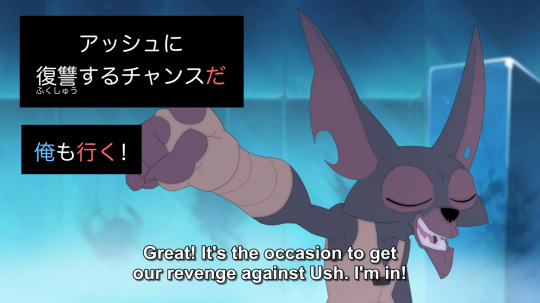
"Asshu ni fukushū suru chansuda. Ore mo iku!" [It's a chance to get revenge against Ush. I'm going too!]
"俺" [ore] - I, me. Masculine personal pronoun, and like everything masculine, in japanese it's associated with a certain degree of arrogance, antagonization, and rudeness.
PERSONAL NOTE: This pronoun is not something one can use in polite speech, but imagining Atcham resorting to using "boku" or "watashi" gives me psychic damage. If Wakfu was a Japanese series, I assume he'd be a character who is always a bit rude.
We can also observe the usage of the informal "だ" particle, and "行く" [iku], which is a verb that means "to go" in an informal conjugation.
Kerubim

"Washi-ra o hīrō hyouzou no korekushon ni kuwaeyou to" [He wanted to add us to his hero ice sculpture collection, pretty much.]
"わし" [washi] I, me "わしら" [washi-ra] - we, us Here we can see the personal pronoun "washi" with the pluralizing suffix "ら" [ra]. In media, "washi" is used by well-learned, elderly men. If there's a white-bearded centuries-old wizard-king who gives out quests, he probably uses "washi". Gandalf from Lord of the Rings and The Hobbit uses "washi" in the Japanese translation.
PERSONAL NOTE: I think Kerubim, as someone who perpetually dies and is reborn and has to re-age, would probably spend most of his life switching between "ore" as a "young" man, and "washi" as an "old" man. He cares a lot about appearing a certain way, and "a strong man" as well as "a nurturing mentor" are his two favorite images of himself.
"と" [to] is a quote and opinion marker. Japanese language favours vague statements, instead of saying that you're sure of something. There will be a more interesting usage of it later, but here it simply shows that this is being observed. It softens the statement, in a way.

"Washi mo iku, hisabisa no Ekafurippu da. Kono neko ni makase toke!" [I'll go too, it's been a long time since I've been to Ecaflip. Leave it to this kitty!]
There isn't much to say here, besides noting another usage of "washi". The only interesting thing is that Kerubim isn't using official speech, — especially with the informal だ [da] ending particle, which fits him, and the situation itself, well, — as well as the fact that he explicitly calls himself a kitty. (cute)
Joris
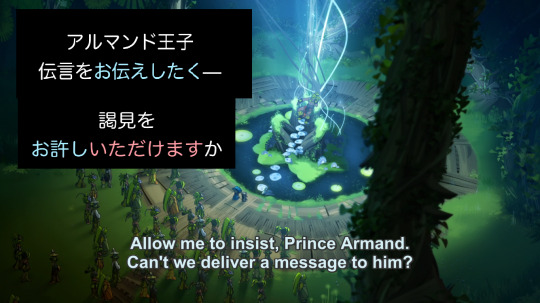
"Arumando Ōji, dengon-o otsutae-shitaku, ekken-o oyurushi itadakemasu ka?" [Prince Armand, I would like to deliver a message. Won't you please grant me an audience?]
Three words of this sentence use polite conjugations usually reserved for royalty (shocking, I know...), or someone else much higher than oneself on the social ladder.
"伝える" [tsutaeru] — to report, to convey. This word has had the honorific prefix "お" added to it
"許し" [yurushi] — pardon, forgiveness, permission. This word has had the honorific prefix "お" added to it.
"いただけます" [itadakemasu] — to be able to receive. This is the polite (kenjougo, humble form showing being lower than the person being spoken to) version of multiple other verbs. (don't confuse this with "いただきます" [itadakimasu], which is said before eating food.)

"Desuga! Bonta no masutā kara tsuyoku iwaremashita. Sheran Sharumu-ō e chokusetsu todoke nebanaranai to." [Nevertheless! The Master of Bonta had strongly insisted. It was said to me that the message must be delivered directly to King Sheran-Sharm.]
"ですが" [desuga] - nevertheless, however, alas. It is a polite word, mostly used in official written texts and not in casual conversations, which is befitting this conversation.
"言う" [iu] - to say, to speak, to tell This word is heavily conjugated into the next forms: "言われる" [iwareru] - to be told (impolite) -> "言われました" [iwaremashita] to have been told (polite)
ねばならない [nebanaranai] - must, should, have to This word is mainly used in literature, and is not the typical way to say "must/should/have to" in day-to-day life. It is not just polite, but downright literary/stiff language.
"と" [to] - grammatical quote marker, "it was said..." particle marking a quote that the speaker heard.

"Sagare. Watashi ga aite suru." [Get out of my way. I'll handle him.]
"下がる" [sagaru] - to move away. The word is conjugated with a "-re" ending, which gives it an extremely strong and authoritative tint, as if used by someone in a position of power towards someone below them.
"する" [suru] - to do, to take on, to perform Has no polite ending here. and is very casual/impolite.
In this "heat of the moment" situation, he drops all politeness out the window, and commands Armand to get out for his own safety's sake.
Here we also get Joris's personal pronoun:
"私" [watashi] - I, me (polite, feminine) Because it is used here with someone Joris has used polite language with, like Armand, it doesn't mean much. But when used with people he otherwise drops his politeness with, — or is supposed to drop it, — this pronoun takes on a different tint. It sounds cold, distant, and aloof, — like he is treating even casual conversations like a buisiness exchange. And if it's not aloof, then it might sound a bit feminine.
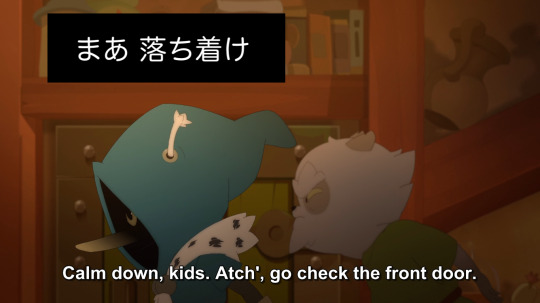
"Maa, ochitsuke" [Heey, calm down]
"まあ" [maa] - well, I guess, just, now, This is an adverb used in casual speech, used to express things like a mild level of hesitation or uncertainty, or to soften a sentence or a request into a more gentle, relaxed one.
"落ち着く" [ochitsuku] - to calm down The conjugation here is, once again, the commanding imperative. However, it's less of a big deal in this situation, considering:
rough language is good and normal, in casual, friendly speech between men.
it's not him using it with a prince that he was previously showering in highly polite speech, but instead a man he's been living with for 600 years (even if said man is his father).

"Watashi no nou wa mada koutteru rashi" [My brain is still frozen it seems]
This sentence is neither polite nor rude. Mostly notable as a yet another usage of "watashi" in the translation.
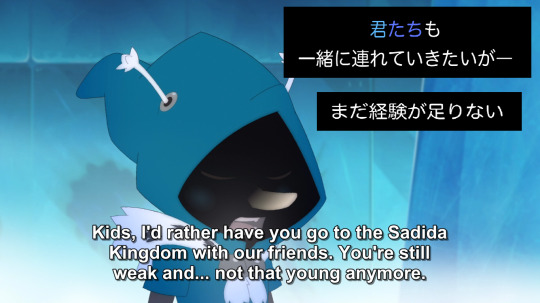
"kimi-tachi mo issho ni tsurete ikitaiga, mada keiken ga tarinai" [I'd really like to take you two (affectionate, derigatory, arrogant) with me, but you're lacking in experience]

Here we can see the first translation error: plus tous jeunes being translated as "too young", instead of "not young anymore". But we'll disregard this, and instead focus on something that deranges me:
"君" [kimi] "君たち" [kimi-tachi] - you (plural) "たち" [tachi] is simply a pluralizing suffix, identical to "ら" [ra] in usage.
Yeah Joris "君" [kimi]'d them. He kimi'd them to death. He looked at his dad and called him kimi. He looked at his uncle and called him kimi too.
I know it's likely that the translator just doesn't know better about their relationship, but Joris WOULD do that. he DOES do this by calling them "kids" in french here, so it fits! (I have a huge analysis of this entire scene in my drafts...)
...What is even wrong with him. I love him.
#ro liveblogs dofus#krosmoz#dofus#randominfopost#wakfu#no manga liveblog today just this + another little post + an announcement in an hour. however posting will resume as normal after today#bc itll be running on a queue loll#see you in 2 weeks.#joris jurgen#kerubim crepin#atcham crepin#When I have the time (after my trip)#I'd like to make an index of tu/vous usage by these three and also look at the unofficial japanese sub of the movie.#because im normal about linguistics. obviously.
43 notes
·
View notes
Text
Not long after China’s leader, Xi Jinping, rose to power in 2012, close observers grew puzzled at how readily he squandered many of the advantages that the country had accumulated over decades of low-friction diplomacy and world-beating economic growth.
Early in his rule, Xi stepped up aggressive moves to claim territorial rights over virtually the entire South China Sea. China also began to accelerate the modernization of its armed forces, rolling out new aircraft carriers and other military technology, and Xi alarmed neighbors with his exhortations to the military to prepare to not only fight, but also win, wars.
At home, Xi began a sweeping anti-corruption drive that quickly looked like a campaign to cow critics and potential rivals. Soon, the regime expanded this political offensive to further constrain speech, and then to bully and humiliate the heads of some of China’s most successful businesses, such as Alibaba, whose fast growth and innovation had helped power the country’s rise.
Many Chinese people justified authoritarianism by turning to the familiar argument that the concentration of power in a disciplined executive can get things done in ways that are not possible amid the palaver and chaos of democracy. For years, Chinese graduate students in my classes boasted about this systemic advantage, but that ended with the suffocating atmosphere of Xi’s crackdown and the alarming economic slowdown that came with it.
Suddenly, conversations turned to what political theorists call the “bad emperor” problem. As a new generation of young adults bemoaned the loss of an era of nearly certain opportunity, they began to see life under authoritarianism as a matter of sheer luck. In a blink, they realized, a seemingly enlightened dictator could be replaced by a rash and benighted despot. For those who experienced this pendulum swing, authoritarianism had a crucial disadvantage: Unlike in democracies, which can vote governments out, the people have no recourse but to ride out their bad fortune and hope for a better successor.
Yet this is not just a problem inherent to authoritarianism. In recent days, it has become increasingly obvious that the world’s oldest and most powerful democracy now faces the bad emperor dilemma.
With each passing week, the United States’ vaunted system of checks and balances has shown itself to be largely impotent in constraining U.S. President Donald Trump’s power. As one Financial Times columnist recently put it, his administration is “engaged in a comprehensive assault on the American republic and the global order it created. Under attack domestically are the state, the rule of law, the role of the legislature, the role of the courts, the commitment to science and the independence of the universities. … Now, he is destroying the liberal international order.”
And while most reelected democratic leaders feel hemmed in by term limits, Trump has become more reckless in his second term, repeatedly raising the specter of extending his power beyond the eight-year constitutional limit.
Ironically, some of Trump’s most foolhardy actions have centered on China. On Wednesday, he paused his arbitrary and irrational imposition of high tariffs on nearly every country—except China. Though Trump may not realize it, his theatrical escalation of tariffs on China, which he raised to 145 percent, will likely be a gift to Xi.
Yes, Beijing will face difficulties in the short term—perhaps even the long run—but Trump’s behavior distracts Chinese people from Xi’s own shortcomings and lends force to Beijing’s long-standing propaganda about the superiority of its political system and Washington’s villainous designs in trying to keep China down.
To the world at large, China now looks like a more moderate force in the international order oriented toward stability and the status quo. If a country has to choose a superpower to hitch its wagon to, China may loom as the preferable option.
Trump’s extreme measures against Beijing have opened avenues for rapprochement between China and its ordinarily distrusting neighbors, Japan and South Korea, and between China and Europe. Trump’s sudden need, amid deflating stock and bond markets, to prove his touted ability to strike deals has also probably enhanced Tokyo’s and Seoul’s negotiating power vis-à-vis his administration. Such is the tactical price that Washington will pay for waging a reckless economic war and failing to rein in a president so foolish and drunk on power as to boast that other leaders are dying to kiss his ass.
Why does Trump possibly think this is worth it? As commentators frequently point out, much of Trump’s worldview was forged in the 1970s and ’80s, the waning era of U.S. industrial preeminence. Back then, Trump first blamed Japan and then China for “stealing” U.S. jobs, production, and ideas. For Trump, Washington’s position atop the hierarchy of nations seems to be about nostalgia, yes, but also birthright. And he seems to think that by punishing others through tariffs, he can restore what was supposedly taken from the United States.
This badly misunderstands not only basic economics, but also world history. It is true that China has likely stolen intellectual property from abroad—from some of the technology in its impressive high-speed trains to the designs of its fighter jets—and devised ways to protect its economy from competition during its recent decades of stirring growth. However, Trump seems unaware that rising powers have done this throughout the modern era, including the United States in the 19th century.
But China’s leadership in automobiles, transportation, renewable energy, and robotics—and its increasingly close peer competition with the United States in artificial intelligence and space exploration—cannot just be explained away by theft. What Trump does not realize is that most of China’s accomplishments have come from the hard work and sacrifice of its people, along with continuous and purposeful national reinvention. In industry, this has involved identifying frontier fields, such as biomedicine and robotics, and investing heavily in them. And that has been supported by equally concerted pushes to improve higher education and make it more widely available.
Bad emperors are not only self-sure and impulsive. They also tend to be badly informed. That is because by the time they have fully subjugated their own political party and surrounded themselves with yes-men, they are rarely exposed to information that contradicts their views.
Trump has conflated his sense of his own invincibility with that of the United States. Because no one at home has been able to resist him, he now imagines that no one in the world can, either—even when members of his administration make contemptuous statements about China that flirt with racism. Vice President J.D. Vance said last week that Americans shouldn’t borrow from “Chinese peasants.” On Sunday, U.S. Commerce Secretary Howard Lutnick dismissed the Chinese factories that have made the global smartphone revolution possible as places where hordes of laborers do little more than “[screw] in little screws.”
Meanwhile, U.S. Treasury Secretary Scott Bessent said this week that China’s business model is broken and “can’t survive” without U.S. markets. (Never mind that China’s exports to the United States as a portion of its global exports have steadily declined from a high of 42 percent in the late 1990s to around 13 percent today.) Bessent imagines a world in which Beijing would be amenable to Washington dictating: “You rebalance. You consume more, manufacture less. We’re going to consume less and manufacture more. … We’re going to level the playing field by a lot.”
This hubristic remark, made by a man often portrayed as the most sober of Trump’s advisors, is stunning in its naivete. It reflects Trump’s nostalgia for an all-powerful U.S. past—a time of deals such as the 1985 Plaza Accord, an agreement that seemingly at the stroke of a pen realigned the world’s major currencies in an effort to reduce the U.S. trade deficit with West Germany and a then-formidably competitive Japan.
But even a China that has started to slow down economically and shrink demographically is quite unlike the Japan of the 1980s, a far smaller country that depended on trade with the United States and relied on it for security. Not only is China roughly 11 times more populous, but in little more than a generation, it has also become the leading trading partner of most countries, a greater source of finance capital than the World Bank, and a military power of the first rank.
“China is an ancient civilization and a land of propriety and righteousness,” China’s Foreign Affairs Ministry said in a recent statement. “We do not provoke trouble, nor are we intimidated by it. Pressuring and threatening are not the right way in dealing with China. China has taken and will continue to take resolute measures to safeguard its sovereignty, security, and development interests.”
Rhetoric aside, this sober statement from Beijing is basically right. The United States will not be able to intimidate China on the basis of tariffs, nor through a bad imperial president’s exaggerated sense of his own power and the nation’s capabilities. It must look at its own weaknesses—not with misplaced nostalgia for a past that is never coming back, but with a positive and demanding agenda for the future.
9 notes
·
View notes
Text
Dug up a very old paper I wrote almost 6 years ago titled "Tianyuan Feminism and Women in Contemporary China," putting it here if anyone's interested in reading this verbose thing:
Zhonghua tianyuan nüquan, which literally translates to “Chinese rural feminism,” is a term that became popular on the Chinese internet in recent years. It should be noted that the phrase nüquan, meaning “feminism,” is used ironically and negatively within the term, as the zhonghua tianyuan nüquan represents a set of beliefs contrary to feminist ideals. Also, zhonghua tianyuan, meaning “Chinese rural,” does not indicate the rural areas of China, but as is generally agreed by Internet users, refers to a breed of domestic dogs indigenous to China. Therefore, “Chinese rural” really signifies the indigeneity of the concept. The phrase tianyuan, which means “rural,” can also refer to an idyllic countryside far from the scenes of buzzling life, and its implication of utopian impracticality leads to some people’s interpretation of tianyuan as “empty talk with no practical results” (Du, “A Reinless Wild Horse in the Age of New Media”). For the sake of brevity, I will refer to zhonghua tianyuan nüquan as “tianyuan feminism” in my following analysis. I will discuss the meaning of tianyuan feminism, its indigeneity, the possible reasons for the rise of such phenomenon, and people’s usages of and responses to the term.
What is tianyuan feminism?
In a discussion board titled “what’s the definition of tianyuan feminism?” on Zhihu, one of the most popular online forums in China, a top comment that received over eight hundred likes defines tianyuan feminism as thus:
Tianyuan feminism is a freak born of the hybrid of the remnants of Chinese feudalism and Western consciousness of individual rights. These women have no idea what feminism is. They want the benefits of Western idea of equality, but neither are they willing to let go of traditional gender notions. This double standard is, in essence, a form of utilitarian selfishness and greed […] Only the unique social and cultural environment of China can give rise to such grotesque “feminists” who ask men to provide for the family like women in Japan and Korea do, but also try to get away with responsibilities by evoking the ideas of personal freedom and rights like women in Western societies[1].
While the commenter did not specify what responsibilities these women try to avoid, many of the male internet users who complain about their girlfriends or wives being “tianyuan feminists” list the shirking of economic responsibilities by the women as the primary problem. More specifically, women labeled “tianyuan feminists” would demand that their male partners pay for everything either on dates or within a marriage – which include the wedding, the house, the cars, and other daily expenses; they would push men to earn more in order to amply provide for themselves, and would chastise their male partners if they fail to do so. The underlying logic of such practice is that women are the weaker sex oppressed within the patriarchal system, therefore they should be compensated and taken care of, meaning that all responsibilities go to men. One of the main arguments used by tianyuan feminists is that women have done their essential part in marriage by giving birth to children; since they have made their main contribution through childbirth, men should take up all other responsibilities. One can see at a glance that tianyuan feminism is the opposite of what real feminism stands for: by shoving all economic responsibilities onto men, tianyuan feminists deny their own potential to excel professionally and achieve economic self-sufficiency, and by seeing their greatest value in giving birth to children, they objectify themselves and ignore their innate self-worth. It is not self-esteem, self-fulfillment, independence, or equality that they strive for, but material benefits and superior treatment from the other sex. Tianyuan feminists have internalized the idea of feminine inferiority, and instead of challenging the patriarchal system, they try to exploit it to their own advantage.
Tianyuan Feminism versus Feminism
The curious thing is perhaps that tianyuan feminism is associated with feminism at all. Unlike the principles of human rights and equality upon which feminism is built, tianyuan feminism devalues both men and women by objectifying and commodifying them, and as one commenter on Zhihu crudely but vividly describes tianyuan feminism: “the man keeps the woman like a pet, and the woman sees the man as an ATM machine” (Zhihu Journal: Women’s Rights Equals Human Rights 63).
However, tianyuan feminism is associated with feminism because, first of all, tianyuan feminists demand rights as feminists do, although they do so from the premise of accepting the patriarchal system and their gendered inferiority. While by definition tianyuan feminism is a form of “false feminism” or mockery of feminism, many Chinese internet users genuinely confuse tianyuan feminism with real feminism, and even consider tianyuan feminism to be a branch of feminism. This confusion leads to further stigmatization of feminism on the internet, adding the accusations toward tianyuan feminism such as “selfish,” “materialistic,” and “unreasonable” to the already proliferating vilifications of real feminism. It also reflects a trend of thought on the internet which conveniently attributes every objectionable behavior or mentality of women to the influence of feminism. As Chinese scholar Dong Jing notes in her article:
If women says things that are too ‘radical,’ it is at the instigation of feminism; if women ride roughshod over men, it is because of the ‘cancerous’ influence of feminism; and if women do not wish to apply themselves in work, and ask men for financial support instead, the fault is with feminism again, and such women are called ‘feminist sluts’ with double standard – it is as if women are led astray all because of feminism. (Dong, “Don’t Yell ‘Feminism is Cancer’ if You Don’t Understand Feminism”)
The confusion of tianyuan feminism with feminism stems from people’s limited and often biased understanding of feminism in China. Feminist ideas were introduced into China at the end of the nineteenth century, but as Li Yue observes, “Throughout the hundred years between its emergence and the present, feminist movement in China has always lacked theoretical explorations and guidance, and Western feminist movements have had very limited influence on feminist movement in China” (Li, “A Comparison of the Development of Western and Chinese Feminist Movements and Their Emergence”). The peripheral status of feminism in China means that issues and ideas associated with feminism have never received sufficient attention or clarification.
Feminism in China took roots during a series of social reform movements starting from the late nineteenth century, such as the Hundred Days’ Reform and May Fourth Movement, which introduced Western ideas of human rights, democracy and equality into China. During that time, women activists such as Tang Qunying and Qiu Jin actively participated in revolutionary movements and demanded political rights for women, while in the literary field, “protofeminist contestations of women’s identity” began to develop “in the writings of women like Zhang Ailing, Lu Yin, Shi Pingmei, and Ding Ling, who has been called ‘the founder of modern Chinese feminism’” (Schaffer and Song, “Unruly Spaces: Gender, Women’s Writing and Indigenous Feminism in China”). However, a fully-fledged women’s movement never took shape, either during the turbulent revolutionary times of the early twentieth century or in the following hundred years. Women like Tang Qunying and Qiu Jin were exceptions in a male-dominated political landscape, as much as is the case now in the Chinese political scene, where “no woman has ever ascended to the elite Politburo Standing Committee, the small cabinet that effectively runs the country in concert with the president,” and where “the pattern of under-representation ripples down through the entire political system” (Cunningham, “Good Girls Revolt: The Future of Feminism in China”).
Besides its peripherality, women’s movement in China never achieved independent status, but has always been seen in association with the larger social and political context. Xu Jiaqing and Li Xi comment on women’s liberation movement in China during the last century that “women’s liberation movement in China has always been led and guided by Chinese men, and is closely linked to China’s social revolutions and constructions. Men were the first to realize, on the social level, the oppression and abuse of women by the feudal tradition, and consequently put forward the slogan of ‘equality between men and women’” (Xu and Li, “Feminism in Chinese and Western Contexts”). The situation has not essentially changed in contemporary China. In their 2007 article “Unruly Spaces: Gender, Women’s Writing and Indigenous Feminism in China”, Kay Schaffer and Song Xianlin note that “the movement towards women’s equality is linked to China’s ‘carefully propagated self-image of socialist modernity at the heart of China’s drive for progress and sovereignty” (Schaffer and Song). If one visits the official website of All-China Women’s Federation (ACWF), the state sanctioned women’s rights organization, one can see that the front page is occupied by the slogan written in big red letters “Women Heroes Turn Their Hearts to the Communist Party, Making Contributions to Building the New Era.” Women’s liberation and enlightenment is linked to, and ultimately serves China’s economic progress and modernization, while women’s individual rights and self-fulfillment are attributed little importance.
The marginalization and virtually absence of women’s movement and feminist thinking obviously do not help the public to understand and sympathize with the feminist cause, and has contributed to the bizarre situation where, while terms such as nüquan zhuyi (the Chinese translation of “feminism”) and tianyuan feminism are freely and casually used, discussed, and debated on countless occasions across the internet, little action is taken in real life to promote the feminist cause or propagate women’s rights. “Feminism” as a concept seems to be emptied of its innards, or substance as it were, and cannot find a solid foothold in people’s lives or their intellectual understanding. Consequently, vague, misrepresented, or even libelous descriptions of the term “feminism” float around the internet, and become conflated with people’s criticisms of tianyuan feminism, creating a larger stigmatized image of nüquan zhuyi that is at once messy, confusing, and intimidating. As Wang Lan explains in her article “The Spread of Feminism in the New Media Environment:”
Due to the highly open and accessible nature of new media, the varied degrees of enlightenment of its users and the slow development of feminism at one time in our country, the state of unchecked spread of feminist ideas in recent years leads feminism in China to exhibit a ‘Year Zero temperament.’ Some women have rather biased misunderstandings of feminism, others try to avoid responsibilities in the name of feminism, giving rise to ‘tianyuan feminism’ which stresses personal rights but shuns obligations. Due to the spread of this erroneous ‘feminist’ thinking, many people developed an aversion to feminism even before they can get to know what feminism is truly like. (Wang, “The Spread of Feminism in the New Media Environment”)
While tianyuan feminism may have started out as ironic criticisms of beliefs and practices contrary to true feminist ideals, it has sometimes been subsumed under feminism due to people’s insufficient knowledge in and misunderstanding of both nüquan zhuyi and tianyuan feminism. Many internet users express the belief that nüquan zhuyi (or feminism), just like tianyuan feminism, possess the central tenet of exploiting men and serving women’s self-interest. This state of affairs is apparently detrimental to the development of feminism in China. As a commenter on Zhihu insightfully remarks, “considering that feminism in China has not yet taken shape, and that there aren’t so many feminists in China yet, to throw around labels such as tianyuan feminism and false feminism could strangle feminism in the cradle[2].”
Women’s condition in contemporary China
In this section I would like to explore the reasons that may have led to the rise of tianyuan feminism. While tianyuan feminists are characterized as materialistic and self-serving, one main reason for it is probably the financial and social insecurities that women in contemporary China face, as Schaffer and Song observe:
The market-driven reforms and Open Door policy have had more negative effects both materially and symbolically for women. The reforms offered men increased opportunities in education, employment and financial success. Women, however, had to face the dilemma of choosing between the demands of a career or a family. (Schaffer and Song, “Unruly Spaces: Gender, Women’s Writing and Indigenous Feminism in China”)
Workplaces are often more willing to employ men because women’s pregnancy delays work progress, and many women leave their jobs after giving birth, making them a destabilizing factor at the workplace. Besides workplace discrimination that makes it harder for women to find employment, women who give up jobs to take care of their children become financially dependent upon men.
Besides women’s financial insecurity, traditional gender discrimination against women accentuates their social insecurity. The traditional saying “a daughter that is married off is like spilled water” accurately reflects the mentality of many Chinese families who see a married woman as belonging to and subsumed under her husband’s family and dependent upon her husband, and is no longer part of her original family. This means that it is harder for women than men to gain financial and emotional support both from her parents and from her in-laws.
The economic and social vulnerability of women contributes to some women’s desperate determination to seek financial security and guarantees of material comfort from the most convenient and apparent source – their male partners (a defining trait of tianyuan feminists). While women’s financial and social independence is another route, it is not necessarily encouraged by society. After women’s liberation in the early twentieth century and the “iron-girls” of Maoist era who actively participated in socialist constructions, the present market economy, where “the collusion between capital, patriarchy and state is hardly rare” (Song, “Is Chinese Feminist Thoughts Abducted by Western Theories?”), sees a return of women to the traditional gender role of wife, mother, and beautiful object. According to Tania Angeloff and Marylène Lieber,
The move from a planned to a market economy had significant consequences on the evolution of inequalities between the sexes. While the Maoist state (1949-1976) sought – at least in official discourse and employment policy – to eradicate inequalities between men and women and their adherence to pre-communist traditions, the reform and opening policies adopted in the late 1970s were largely built on the traditional representations of women’s role in the family and in society. (Angeloff and Lieber, “Equality, Did You Say? Chinese Feminism After 30 Years of Reforms”)
All-China Women’s Federation (ACWF), which voices the state’s view on women’s rights, also tilts the public opinion toward seeing women in their traditional role – that is, within the family. An article published on the ACWF website on October 29, 2018 quotes president Xi Jinping saying “we should stress women’s unique role in promoting China’s traditional familial virtues” and “women around the country should voluntarily shoulder the responsibilities of taking care of elderly family members and educating children, as well as upholding familial virtues[3];” another article on the website, published on November 13, 2018 titled “Shao Yanlin’s Family: Good Wife Setting Positive Example by Looking After Sick Father-in-law” details the life of Shao Yanlin, who takes care of her father-in-law with laryngeal cancer, and is rewarded the title of “the good wife of Gu-lu-ben-jin Village[4].”
The aforementioned workplace discrimination and women’s internalized perception of their dependent status and essential role as wife and mother is reflected in a national survey conducted in 2010:
The Third Survey of Women’s Social Status in China in 2010 shows that almost 62% men and 55% women believe that “men belong to the public life, while women belong to the family,” with the percentages rising 7.7 and 4.4 percent compared to 2000; at the same time, wage gap is broadening. In urban areas, the average yearly income of women is only 67.3% of that of men, and the percentage is 56% in rural areas, with the percentages dropping 10.2% and 23% compared to 1990. (Liu, “‘Crazy Women:’ From Version 1.0 to 2.0”)
It is not only the governmental opinion that leads to a regressive view of women’s place in society, but the popular media as well. As Liu Jin argues,
From the images incessantly constructed by the media of women as traditional good wives and good mothers or modern ladies valued for their pretty faces, we can smell the rotten and outdated values and gender notions that should have been eliminated. Media’s portrayal of women unconsciously influences its audience’s (including female audience’s) perception of women: that women are meant to do housework and sacrifice their careers for family, and that it is in their nature to bear and raise children. This prevalent view, attitude or prejudice means that men keep their dominant social position and women’s status is weakened. (Liu, “The Construction and Subversion of Popular Internet Term ‘Straight Man Cancer’”)
The media and the consumerist market not only promote the idea of women’s retreat into traditional family roles and female objectification, but also harmfully encourage women to seek self-value in material possessions and self-objectification. Advertisements and promotional texts from companies that sell luxury and fashion products are often identified by internet users as sources of information that foster a tianyuan feminist mentality. These advertisements and texts tell women that they deserve to treat themselves better, that the products they buy reflect their own beauty and sophistication. In this way, women are encouraged to over spend, and consequently often turn to their boyfriends or husbands for money.
We can see that in contemporary China, women are still beset with gender inequalities, economic and social disadvantages and pernicious and outdated gender notions. While these factors should not justify tianyuan feminism, they do contribute to its emergence as a social phenomenon.
Usages of and Reactions to Tianyuan Feminism
I have discussed how tianyuan feminism can be mistaken as one kind of feminism by some internet users who have misunderstandings about the subject, and can serve to further stigmatize feminism. On the other hand, more enlightened internet users have tried to clarify the difference, in fact the clear opposition between tianyuan feminism and feminism, and explain that feminism does not stand for gender superiority or women’s exploitation of men, but can actually help create a win-win situation for both sexes where there is shared responsibility and mutual respect, and neither sex need to suffer gender stereotypes and their accompanying social expectations.
Due to the fact that tianyuan feminism is a popular internet term with no traceable origin and no authoritative definition, and have passed through the hands of countless internet users, it is by nature sensational and ambiguous, and have picked up a complex host of connotations, implications and associations along the way. From Du Yunfei’s definition of tianyuan feminism in his article on tianyuan feminism, one can glimpse the confusing assortment of conceptions that tianyuan feminism has come to represent:
The group identified as tianyuan feminists on media platforms usually exhibit the following immoderate qualities: firstly, they detest men and patriarchal power, and when discussing topics of gender inequality, they aim their criticisms at men under all circumstances; secondly, they want to enjoy personal rights without undertaking obligations, and consider themselves to naturally possess moral high ground in society, at work, in the family and in relationships between the two sexes due to their biological inferiority; thirdly, they hate traditional gender roles, especially those that demand self-sacrifice for the sake of marriage or family, and they disapprove docile, beautiful and family-oriented women who are perfect in the traditional sense; fourthly, they have extremist attitudes and give radical speeches, and overexaggerate the unfavorable conditions in which Chinese women live.” (Du, “A Reinless Wild Horse in the Age of New Media”)
The four definitions put together can hardly describe one single type of woman: while the woman of the second definition is passive and dependent, the woman described in the other three definitions is angry, extreme and men-hating. We can see that besides being used to refer to women who believe they have every right to leech off the patriarchal system, tianyuan feminism has also come to represent extreme and men-hating speech and behavior. On other occasions, tianyuan feminism has been used as a generic insult to women with feminist tendencies, or even used to demonize feminism. For example, some internet users believe that tianyuan feminism is feminism in its extreme and irrational form that aim to exterminate all men and establish a matriarchal society. Other times, tianyuan feminism is linked with issues of race and sexuality: some see Chinese women who prefer wealthy white men to Asian men as tianyuan feminists; others claim that tianyuan feminists have a particular hatred for straight men but leave gay men alone. When browsing the internet, it is easy to get lost among the endless arguments, assertions and heated discussions, which, nevertheless, reminds one of the connotation of the phrase tianyuan mentioned at the beginning of this paper: “empty talk with no practical results.” The enthusiastic debates about tianyuan feminism and feminism online forms an ironic and stark contrast to the silence and inaction regarding the issues of women’s rights and social conditions in real life. While discussions about feminism on the internet can help raise awareness on the subject, Chinese women and the Chinese society have a long way to go in defending women’s rights and fostering the ideas of gender equality, self-respect and self-worth in women.
[1] See Zhihu discussion board (https://www.zhihu.com/question/266449349/answer/439864556).
[2] See Zhihu discussion board (https://www.zhihu.com/question/266449349/answer/439864556).
[3] See online article (http://www.women.org.cn/art/2018/10/29/art_19_158955.html).
[4] See online article (http://www.women.org.cn/art/2018/11/13/art_19_159188.html).
31 notes
·
View notes
Text
Valentine's Unknown Sender
A couple of people don't find the Valentine sender's speech in tandem with Gaster's, which I completely agree with! However, not everyone can see what we mean, so let me show you. But before we continue, I should clarify that I'm not a fluent Japanese speaker and am just going off of what little I know about the language.
Now, let me show you the two (out of three) Japanese writing systems: hirigana and katakana.

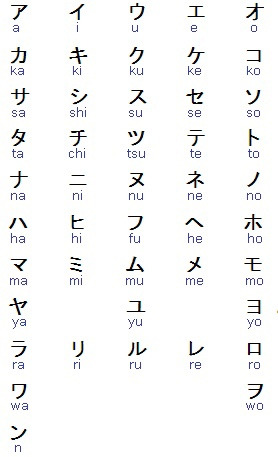
It helps me think of hirigana as 'squiggly' characters and katakana as 'stiff'. The last one, kanji, you'll recognize immediately, as they can be confused with Chinese characters due to their complexity (and, well, origin).
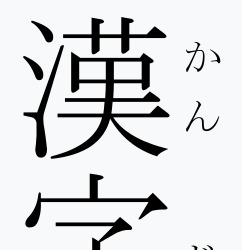
One of the points I've seen is that the style change is simply due to informality of the letter. Someone also said that it was written this way so we couldn't recognize who was speaking. To get the latter possibility out of the way: during the release of DELTARUNE, the name of the account was blurred out, making them appear as a seemingly unknown person (everyone knew it was our lovable silly goober). Though, they still had a recognizable.. style. They spoke in stilted kanji + katakana. No hirigana anywhere, which is a strange mix. Kanji + hirigana? Sure. But excluding katakana instead of hirigana is weird. Katakana is used for names, loan words (and can also be used to show a foreigner speaking Japanese), names for species, emphasis, and also to indicate unnatural speech, often used for robots (which is the case for Queen, by the way).


Now, the Valentine's person? No kanji. They only use hirigana and katakana. Excluding kanji is very weird, too. But JRPGs at the time (which Toby loved deeply, as there are countless references to them in the game) had hardware limitations, so this choice was somewhat of a tribute. This also applies to the Light World in DELTARUNE, which resembles Undertale heavily. However, in the Dark World, kanji is used. This stranger who people believe to be Mike would have to be a Lightner to speak without using kanji. Which makes me doubt that this is Mike at all. He has an affiliation with Spamton, with Tenna. They go a long way, before the fountain opened. And a Lightner can't enter a Dark World without one. More on that later. Back to the letter, the grammar mistake is not accidental. In the Japanese version the sender writes "サラ ば!" which should be either in full katakana (サラバ) or full hirigana (さらば), not a weird mix. Also, 'goodbye' in Japanese is one word and should not be separated like that. So, same thing with the letter. While we're not told who it is, their speech still has distinct features. 🎉 PRONOUN TIME 🎉🎉 Who uses what? (I've highlighted Gaster in bold where needed.)
I: watashi (わたし) by both You: kimi (キミ) vs anata* (アナタ -> あなた) [* -- kimitachi in Entry 17] We: watashitachi (わたしたち) vs ware-ware (ワレワレ -> 我々)
Watashi is a regular formal first-person pronoun. Kimi (+tachi for plural) is a more casual second-person pronoun, can either be used by a superior to refer to a subordinate or one's equal. Anata is a respectful second-person pronoun. Ware-ware is a first-person plural pronoun used by either ancient beings or just someone old and important. The download page for DELTARUNE in 2018, the SURVEY_PROGRAM itself, the SAVE menu, the GAME OVER screen -- all of them share these same speech quirks, mannerisms. Gaster isn't just "formal", he speaks very slowly, often separating a sentence in two parts by starting off a new line. He uses very peculiar wording and it's as if he's struggling to speak. Picture an alien trying to communicate in our language, or a human that knows this 🤏 much [insert language], trying to form a sentence.




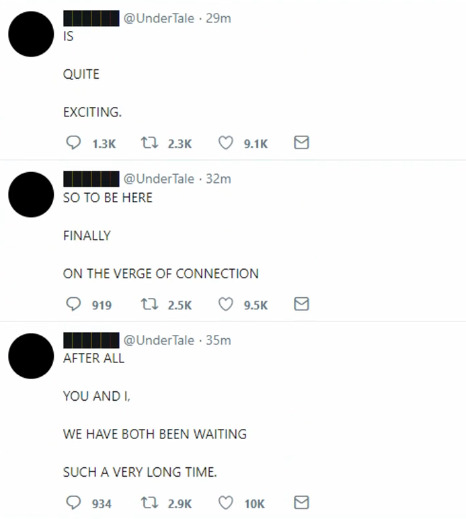
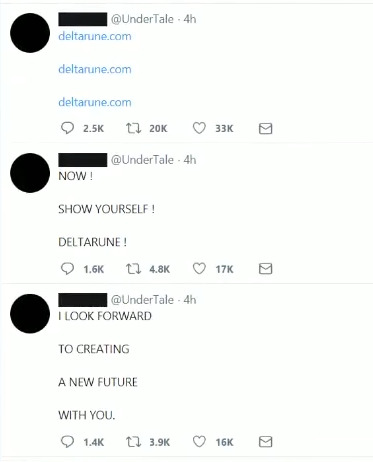
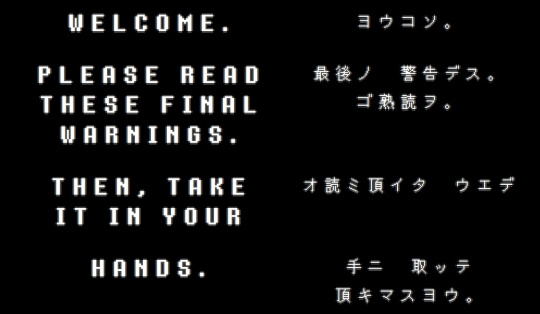
youtube
youtube
Gaster's quirks are also present in Japanese, the localization reflects what I just talked about. He's unnaturally stiff. He also never uses commas, and it's not about formality -- it's a distinct feature of his.





(For the Love of God Can You Embed Like a Normal Video)
Also, there have been suggestions that it could be another piece of Gaster. We already got a glimpse of what he was like pre-accident, and it's ENTRY 17. It lines up with the Gaster that accompanies us throughout chapter 1. And that means we are dealing with the most cohesive 'piece' of him. Why would, then, there be such an opposing part of him? It doesn't line up.
Personally, if this was about Gaster, I wholeheartedly agree with carlyraejepsans's take. And the only case which I'd agree on is DR Gaster.
So, here's the "later". The person knowing about the DELTA RUNE could line up with them being a Lightner, since they do have it plastered everywhere in the town, don't they? Only the Angel is ever mentioned in the Light World, but I'm sure that just like in Undertale, it's called DELTA RUNE by the Lightners just as it is by Ralsei. It seems to me that only the contents of the prophecy are different, but the name stays the same throughout worlds.
Though, funny how the prophecy is inverted.. I didn't notice it until now. In Undertale the focus is on the triangles and their salvation, while in DELTARUNE the focus is on the winged orb and its condemnation.
"You free the banished" vs "You banish the freest" hehheeh Anyway, it's not about the game, but the prophecy, so the person doesn't have THAT much knowledge. And I doubt they know about Ralsei's version of the prophecy, because other Darkners besides the prince himself don't seem to be aware of any prophecy. All they know is the Knight, which makes sense, since Asriel's doppelgänger stayed at his castle in wait of the Lightners all alone, without spreading a word about it. Neither Darkners nor Lightners know of it. Though, the phrasing does feel odd. Waiting for what exactly? DELTA RUNE? Also, the Japanese version having the name merged kind of bothers me. So, is it DELTARUNE or DELTA RUNE? The translation team does distinguish the two. Why not here? Was it intentional or not? Well, I'll leave it up to someone else to figure out, right now I'm too tired for that.


tl;dr(?): It's not UT Gaster, nor Mike (it's not a Darkner at all). It's a Lightner and possibly DR Gaster.
#gaster#deltarune#gaster deltarune#utdr#utdr newsletter#oughh i am god's sniffliest soldier.#i am practically melting as i am writing this#writings of the feverish#this doesn't rea;;y have to do with anything i guess but#it always rubbed me the wrong way that in UT we only got to see Gaster speak romanized Japanese.#the ONLY character. that spoke romanized japanese but never used the three systems.#the most mysterious character#mmmmmmmmm.#mmmmystery man#i am glad he stopped being THIS mysterious#there is .#more#food#i am so glad deltarune came out#more reasons to spin this creature in my mind as if im microwaving him#i actually wonder how the japanese side of the fandom wrote his dialogue in fanfics or comics or something#about the ware-ware in katakana.#dear dr wingdings gaster.#why.#did you have to do that#you already use kanji. you could've said it normally#japanese speakers probably struggle with his katakana as much as i do
38 notes
·
View notes
Text
Balance of power (updated)
In this post, the powers are up to date, maybe they'll change, but I doubt it now. I haven't added the weapons yet, because I need to post about the new weapons system, as well as the Yin-Yang and Chinese element classifications.
Ladybug Miraculous 🐞 Tikki - Kwami of creation Luck charm no longer exists, since creating an object that always guarantees victory (it's a bit of an op, isn't it?), but it now has 3 powers in addition to purification and healing: Genesis, which allows the user to choose an object to create, just like the goat's previous power. Terraforming allows the user to transform the terrain in any way they wish, limited only to creation. And the third is Demiurgy, which is basically transforming one thing into another (transmutation), which must be something equivalent, and is limited to objects only. *Note: The Purification of Akumas has been split with that of the cat, but only works in Symbioses; and the Repair of Luck (Miraculous Ladybug) only works on things destroyed by villains.
Cat Miraculous🐈⬛ Plagg - Kwami of Destruction I've changed the cataclysm, now with 3 new powers: Corruption creates an energy in the palm of the user's hand that causes a defect in whatever it touches, being regulated by the user in the intensity of the defect, time to start and what the defect will be, which can be either malfunction or resistance worse than sand. A black hole is a point that can be fixed somewhere and attract everything to a single point, or launched, going in a single direction destroying everything in its path until the bearer deactivates it. And the third is the Feral, which basically increases physical characteristics such as speed, sight and strength, as well as creating claws that cut anything, but only for a short time. *Note: Purification only in Guardians; and the Chaos destroyer (miracle ladybug) only works on things created by villains.
Bee Miraculous🐝 Pollen - Kwami of submission Royalty allows the user to give orders to individuals/beings considered, essentially, inferior, and which cannot be disobeyed, only going out of control when they finish the order. Devotion allows an ally a brief increase in powers, as they are "blessed by a queen" if they accept the bearer as their "superior".
Turtle Miraculous🐢 Wayzz - Kwami of protection Barrier allows you to protect any part of your body, allies or objects with a thick, hard barrier that can last up to a certain amount of damage. Resistance protects the bearer or object, making it invulnerable to physical and magical attacks, creating a wave that pushes opponents away, the weaknesses being the powers of the cat and ladybug (demiurgy).
Fox Miraculous🦊 Trixx - Kwami of Illusion Make believe is basically the mirage, but with the difference that it can't be applied to the user, apart from the illusions becoming "real" for those who believe it is real. Trick is an exchange of senses, allowing you to change the enemy's senses or erase them, the greater the change, the shorter the illusion time.
Peacock Miraculous🦚 Duusu - Kwami of imitation Mimer forces the opponent to imitate his movements until he loses visual contact, even minimally. Kaleidoscope allows you to imitate the last attack received on a smaller scale of power, but with multiple attacks.
Butterfly Miraculous🦋 Nooroo - Kwami of manifestation Symbiosis allows you to create a parasite (caterpillar) which, when it comes into contact with another being with emotions and will, it is forced to follow its main will/desire at the moment, gaining powers to fulfill its desire, and initially it has control of itself, but little by little it loses control and becomes a zombie of its will. Guardian (butterfly/moth) allows you to create a being that will do the bidding of its creator (target), and cannot be controlled, only doing the bidding, with the shape and powers to fulfill that wish. *Note: to cease to exist, you must knock out the villain.
Rabbit Miraculous🐇 Fluffy - Kwami of Multiplication Divider allows the user to split into identical copies, where only the snake can tell the difference, and who share their experiences, being able to split unlimitedly, however, their copies cannot receive much damage, crumbling into smoke.
Snake Miraculous🐍 Sass - Kwami of intuition Clairvoyance allows the bearer to see an ethereal dimension and the essences (inanimate does not possess) of people, thus being able to focus and track a person, from footprints, smell, to seeing through walls;
Goat Miraculous🐏 Ziggy - Kwami of the Opposition Breaker any effect, in itself or in third parties, that the user chooses, will have the opposite effect to the default, before or after receiving the effect, so a slow effect would be agility and vice versa.
Tiger Miraculous🐅 Roarr - Kwami's expression Wave creates a sound wave that the user controls the frequency of and which affects electronics and motor functions, basically being an exchange of senses, and depending on the frequency can break anything.
Ox Miraculous 🐂 Stompp - Kwami of irritation Fury spectrum allows the user to increase their attributes and generate an aura on themselves with any color, the more violet the more powerful, however this depends on your emotions, in addition to the more powerful you get, after the effect wears off, you will feel great muscle pain.
Horse Miraculous 🐎 Kalkki - Kwami of Migration Glitch allows the user to completely transform their body into something ethereal, being able to "teleport" short and/or long distances, since while transformed, the concept of time doesn't exist, thus giving the impression of teleportation when they deactivate their powers. However, while activated, he cannot interact with the world, but he can take things into this ethereal "world", as long as he is holding them.
Dog Miraculous🐕 Barkk - Kwami of cooperation Barkk allows you to create an invisible chain, sharing anything from damage, vision, thought, strength, speed, movement, except powers; being limited to just 1 attribute, but it doesn't have to be between the user and another, it can be opponent and another or user and animals (although it would probably be used for sight, as it's already too cruel to use it).
Mouse Miraculous🐀 Mullo - Kwami of proportion Scale allows the user to change the size of objects, themselves or both, not limited in size, being able to increase or decrease the size, not bringing the complications of the sudden change of size.
Pig Miraculous🐖 Daizzy - Kwami of gratification Payback allows the user to repay a target for their "karma", so the worse the person, the worse this "gift" will be, it could be pain, numbness, bleeding, or if it's good, boost, protection, etc.
Rooster Miraculous🐓 Orikko - Kwami of prediction Sixth Sense allows the user to predict the opponent's actions and the things around them, being limited to only one target at a time.
Monkey Miraculous🐒 Xuppu - Kwami of experimentation Incognito allows the bearer to "add" a characteristic, previously not present in the object, to experiment with the effects, one more being: "what if that ball was heavy" or "what if that pencil was explosive", being totally limited to: not turning the object into something magical (indestructible, repelling magic, those things out of the ordinary for us).
Dragon Miraculous🐉 Longg - Kwami of mystification Awake allows the user to transform and gain abilities from any material she touches when activating her power, "turning" into a dragon/semi-dragon from the material, the abilities vary from material to material, from manipulating it to being able to generate or survive on it.
16 notes
·
View notes
Note
I love when gringos drop the ‘all argies are nazi grandkids’ shit cause like. Oh okay so you WANT me to cook your ass huh? You want me to remind you about operation paper clip? You want me to remind you that your cops are all Nazis? That your soldiers are too? You stupid fuck? Which country gave Germany back to the Nazis? Huh? And then they get really mad and it’s funny watching them cry and accuse me of being a trump supporter or some stupid shit like that.
Exactly. Usamericans have a huge problem and that is that they live in an imperialist country. So not only are they constantly and abusively fed military propaganda but their ethos is basically maintained through the belief that the United States is always somehow morally superior to any third world country. Couple that with the fact of a lack of individual responsibility to recognize their own place in the world and there you have the perfect combination to justify a supposed "ignorance," an ignorance that can be forgiven for being harmless. Another problem is the lack of intersectional thinking that articulates the struggle against oppression of any kind. If the only struggle that matters is the struggle against patriarchy, why bother with deconstructing your racism or your classism? This is what gives them the perfect excuse to say that Argentines are all Nazis and white, that all Chinese are brainwashed by the government, that all Muslims are homophobic, etc. It's enough to cling to a stereotype for a single tree to cover the entire forest.
So: belief in the superior morality of their own country, even if they make some criticisms sometimes; a supposed "innocent ignorance", which allows them to put all the blame on the education system; constant pro-imperialist propaganda; lack of intersectional thinking. In an election year like this one, it's inevitable that all this will become evident.
7 notes
·
View notes
Text
China’s defense revolution: Lessons from the India-Pakistan conflict
The recent India-Pakistan conflict of May 2025 has profoundly reshaped global perceptions of military power and technological dominance. Pakistan’s decisive air superiority, achieved using Chinese-made military systems, challenged the long-standing belief in the supremacy of Western military technology.

https://www.workers.org/2025/05/85731/
2 notes
·
View notes
Text
Thailand Long-Term Residency
Thailand's long-term residency system presents a multifaceted array of options, each with distinct legal frameworks, bureaucratic processes, and strategic advantages. Unlike many Southeast Asian nations, Thailand maintains a carefully regulated immigration system that balances economic priorities with national security concerns. This exhaustive guide examines all viable pathways to long-term residency, analyzing their legal foundations, practical requirements, and often-overlooked nuances that can determine application success or failure.
2. Permanent Residency: The Gold Standard
2.1 Historical Context and Current Policy
Established under the Immigration Act B.E. 2522 (1979)
Annual quota system introduced in 2008 (100 per nationality)
Processing times now exceed 24 months due to security vetting
2.2 Eligibility Deep Dive
Category-Specific Requirements:
Employment: Must demonstrate 3+ years at executive level in BOI company or Thai corporation with minimum THB 1M capitalization
Investment: THB 10M in government bonds or THB 3M+ in qualifying businesses
Family: Spouses require 5+ years of continuous marriage (2 years if with children)
Financial Scrutiny:
Tax records undergo forensic examination by Revenue Department
Bank statements must show consistent balance above THB 500,000
All foreign income must be legally remitted through Thai banking system
2.3 The Hidden Challenges
Language Test: Now includes written component beyond basic conversation
Character Investigation: Includes interviews with neighbors and colleagues
Military Review: All male applicants aged 18-45 undergo additional clearance
3. Elite Visa Program: The Premium Pathway
3.1 Program Evolution
Launched in 2003 as Thailand Privilege Card
Five-tier system introduced in 2021 (from 5 to 20-year options)
8,000+ holders as of 2024, with Chinese nationals comprising 42%
3.2 Structural Analysis
Membership Tiers:
Elite Easy Access (5 years): THB 600,000
Elite Superiority Extension (20 years): THB 2,500,000
Elite Family Premium: THB 1,000,000 per additional member
Operational Realities:
90-day reporting exemptions frequently misunderstood
Work permit limitations for non-BOI companies
Tax implications of multi-year lump sum payments
4. LTR Visa: Thailand's Strategic Talent Acquisition Tool
4.1 Policy Architecture
Approved by Cabinet Resolution on September 14, 2021
Four distinct categories with tailored benefits:
Wealthy Global Citizens
Wealthy Pensioners
Work-from-Thailand Professionals
Highly-Skilled Professionals
4.2 Underutilized Provisions
Dual intent allowance for citizenship applications
Education subsidies for dependents
Customs exemptions for professional equipment
5. Retirement Visas: The Evolving Landscape
5.1 Financial Requirements Decoded
THB 800,000 deposit: Must be seasoned 3 months pre-application
Income method: Requires notarized foreign pension documents
Combination option: Complex calculation formula
5.2 Insurance Mandates
O-A Visa: Minimum $50,000 coverage
O-X Visa: $100,000 with Thai-approved providers
Exclusion clauses for pre-existing conditions
6. Investment-Based Options: Beyond the Basics
6.1 BOI Privileges
Fast-track PR eligibility (2 years vs standard 3)
Reduced capital requirements for strategic sectors
Special economic zone concessions
6.2 Property Investment Realities
Condominium ownership: No residency rights
Leasehold structures: Maximum 30+30 year terms
Usufruct agreements: Judicial enforcement challenges
7. The Citizenship Pathway
7.1 PR to Naturalization Timeline
Year 0-3: Qualifying period
Year 3-5: Application preparation
Year 5+: Naturalization process
7.2 Hidden Requirements
Thai language exam: Now includes reading/writing at grade 4 level
Civic knowledge test: 50 questions on Thai history and law
Name change procedures: Practical implications
8. Emerging Trends and Future Projections
8.1 Digital Nomad Visa (2025 Pilot)
Expected requirements:
$80,000 annual income
Thai health insurance
Minimum 3-year contract
8.2 Tax Law Revisions
Proposed wealth tax implications
Crypto asset reporting requirements
Inheritance tax considerations
8.3 Regional Competition Analysis
Compared to Malaysia MM2H, Vietnam's new visas
Thailand's competitive positioning
9. Strategic Application Planning
9.1 Document Preparation Framework
Primary Documents: 6-month validity rule
Translation Standards: Certified vs. notarized
Legalization Procedures: Hague Apostille exceptions
9.2 Professional Engagement Strategy
When to use:
Immigration lawyers
BOI consultants
Tax specialists
9.3 Contingency Planning
Appeal processes
Alternative category eligibility
Exit strategies
10. Conclusion: Navigating the Complexities
Thailand's long-term residency landscape requires sophisticated navigation through:
Bureaucratic nuance: Understanding unwritten rules
Financial planning: Multi-year commitment strategies
Legal compliance: Maintaining flawless records
Final Recommendation: Develop a 5-year residency strategy incorporating:
Visa laddering from short-term to permanent options
Tax optimization through timing of asset transfers
Family status planning for dependents
For ongoing updates, monitor:
Royal Gazette publications
Immigration Bureau policy circulars
BOI investment promotion updates
#thailand#immigration#immigrationinthailand#thailandvisa#thaivisa#visa#visainthailand#thailanglongtermresidency#longtermresidency#ltr#thailtr#thaiimmigration
2 notes
·
View notes
Text
About those 3 Anon messages recently...
Yes, there's 3 now. Third on came up while I was finishing typing about the 2nd one.
tl;dr context: peeps defending a fictional 2D lego character, questioning the morality of esau (despite the lack of lore context), as well as for some reason a personal attack on me... also smol chinese jesus??? :'D
DISCLAIMER:
I respect y'all's opinions and headcanons and whatnot. It's all valid. However. I expect respect on my own opinions and headcanons return. That's literally all I'm asking.
That's common sense and I will from this point on just delete anyone else's anon asks if they try to argue with me about my standings on these matters mentioned in here. Or this post in general.
There's literally no point in arguing over words written in a story, or debating whether or not pixels on a screen are hot or not.
With that disclaimer being said...
Case 1:
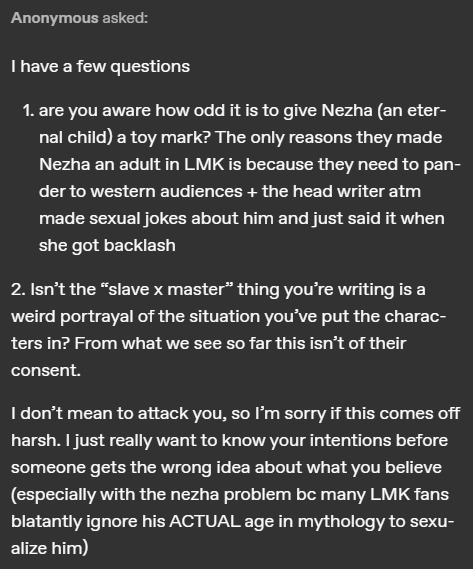
I'm fully aware of the entire discussion thing of Nezha being eternally 12 and all that, but I'm also fully aware of how LMK Nezha is more of a parody on the original. LMK Nezha is more of an adult 2D character who took the characteristics of the source, but then was turned into an aged-up parody.
It's not weird with the context of how things even came to be in the AU. It does involve a form of "infection" that changes those that are infected. In ESAU it's just slightly different from my original story's OCs to appeal more to the Reader. There are people out there who seek comfort in their own superiority complex too, especially if they can never explore that part of themselves normally. If that doesn't appeal to you, that's fine. But don't assume it's weird just because you don't like it if a fictional master/servant relationship isn't for you.
Now, this ask wasn't really bad or directly disrespectful. That was just basic questioning on the general relationship of the AU as well as the LMK Nezha being 12 discussion. So I went to bed, cuz I didn't wanna respond with my rather aggressive response to the topic. Like, I ranted about it to my Discord server, but it was already around midnight and I knew I'd come off as aggressive, despite the logic and facts, if I just copy n pasted the way I phrased the rant. So I went to bed. But then I woke up to an essay in another ask...
Case 2:
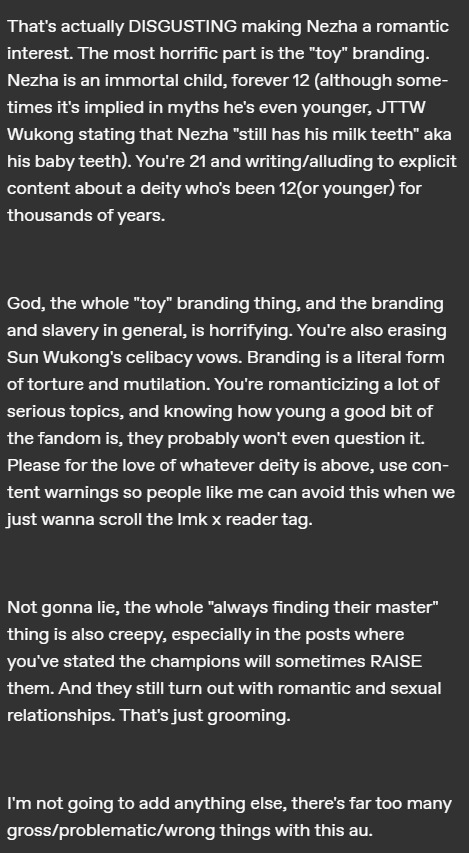
I'm assuming this is the exact same person, based on the timeframe and the writing style..? Maybe even the same person who asked that question about whether I'd make Nezha's relationship towards the Reader romantic or platonic..??
For the sake of this entire thing being unworthy of an unnecessary discussion, as well as the fact that the person sending this isn't worth directly responding to if they hide behind an anon face, knowing they would get flamed, I will solely respond to these for my actual viewers, who do enjoy ESAU.
As in, I noticed how almost every single point is easily arguable. Like, they literally just made it up as if every single relationship between the Reader and their champions is romantic. Which couldn't be further from the truth. This is a point I wanna get more into due to how it covers the Master System more. A random anon sending me questions, or rather statements, like this doesn't deserve to get a detailed response to this directly either. My viewers do deserve more insight though. Be it to avoid more people thinking this is automatically grooming, or just to give interested people more lore dump.
To keep it short: Everyone who wants to be a Reader, is a Reader. I myself am a Reader of fiction, which is why I use my persona to fill in the Reader's space in any drawing I do for ESAU. Which is also why Macaque referred to their Master currently being female in that one drawing- Because in that moment, in my drawings, I'm technically seen as their Master.
So when you see the champions swap between their Master using non-binary or female pronouns, this is why. If you see me draw them referring to their Master as a "she", they're referring to basically their current Master in that exact moment. However, literally anyone else can also be placed in that spot.
Whenever I refer to a Reader's reincarnation, I usually mean either "the same person, but another life" OR "different people of the same/a different life". As in, the Reader can imagine themselves having had multiple past lives, or their "past life" is actually another Reader. We're all the Reader. That's why I kept saying the Master System is rather philosophical.
The Reader can imagine themselves if they met their champions as a child or as an adult. However, nothing in ESAU is forced to be romantic or sexual. If you were born as a prince/princess/royalty, that doesn't mean your servants are immediately destined to be romantic or sexual with you, right? That entire portion is up to the Reader to decide and imagine. I do not control what another person thinks of and imagines. If they chose to pick a darker path, the fuck do you want me to do about that? Unless it ends up hurting anyone, or they actively push the topic onto others, I see no issue with however a Reader wants to think up what happens in their life with their servants. All I do is create material for others to play with.
Except for the First Master, any other Reader can be considered either the same person or various people. That's up to the person behind the screen, whether they feel more comforted with one idea or another.
On the Nezha being 12 topic... Do people know what a parody is, I-
LMK Nezha looks more like THIS-
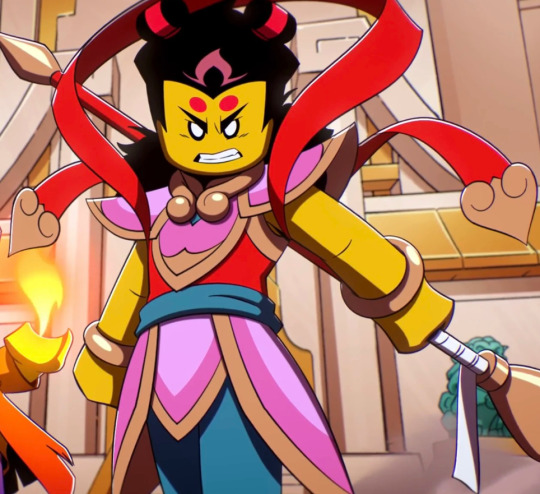
Not as young as THIS-

And he was never said to be 12 years old in LMK. Nor does he look 12, act 12, speak 12, sound 12... LMK needs to be seen and accepted as more like a parody AU of the original story, if that wasn't obvious enough. I find it funny how they brought up my own age though-
Cuz yeah, I'm 21, almost 22, and I do understand the difference between reality's religions, fictional 2D pixels, and the difference between the source and a parody. Wow. Shocker. I know.
Or as I said it in tags earlier today-

Also I'd just like to add… If we go by the theory of specifically LMK Nezha still being 12, despite literally thousands of years having passed, his body being depicted as a fully grown adult in basically every single goddamn aspect of his character within the show… Literally all he got is his paperwork saying he's 12. Like- LMK Nezha would literally just be one of those people that were born on February 29th. Just him not getting any birthdays. Do you assume after literal thousands of years, with his body and mind being mature, and only his paperwork saying he's 12, this dude wouldn't be tryna explore more of himself and his interests, wh-
Like- LMK Nezha isn't the original source Nezha. Simple as that. Just accept it's a parody and be done with it. If you don't agree with it, that's your opinion and I respect that. But don't you dare fucking push that opinion on others who do actually accept the show as a parody and wanna live out their fantasies in said parody.
Your opinion does not mean it's the opinion of others.
Like, the entire age thing in LMK is such a headcanon thing to the point where no one seems to have a solid age, besides maybe MK, who I've seen people calculate his age for due to his driving license and all that. LMK Nezha is confirmed to be depicted as an adult within the show, which is the headcanon I'm going with, regardless of whatever bullshittery people are trying to argue with.
In conclusion: Nezha may be eternally 12 in a story. But that story is NOT Lego Monkie Kid.
On a side note, something I found ironic and funny, is if an aged up character isn't allowed to be sexualized, then I guess if someone ages a character down, suddenly that original source of the character is no longer allowed to be sexualized either, just because that character suddenly has a younger version of themselves. It's not even the younger version that's being sexualized. That literally is the entire logic of this debate on not wanting a fictional character to have an aged up version of themselves.
Good job, nobody wins. I guess nothing can be sexualized at that point- But then again, Rule 34 wouldn't exist then.
Okay, but now this, THIS is where I got REALLY annoyed, cuz NOW we're getting into more personal territory of nitpicking at ESAU. And those who know me are aware of how I go Asian mom mode when my creations, or younger friends and mutuals, are being wrongfully disrespected.
In general, their entire point is a snowflake-behavior nitpick. Branding is also seen as a way to claim ownership over something. The torture part is basically just the pain of it. I could've also just have the champions have one of those toy stamps for lil children be slapped onto them if you really wanna snowflake it all for tHe PrEcIoUs cHilDrEn...
C'mon. I grew up with FNAF and Creepypastas. Which tend to be usually two of the first fandoms I see children get interested in and hyperfixated on. Mentions of brandmarks that have fully healed ain't nothin' at all.
Like, I literally met a boy who was 8ish years old, who was so happy and hyped about FNAF that he asked me to draw Freddy and Bonnie.
Creepypastas also might make one edgy for a while, but they do grow A LOT from it once they leave that phase. So far, everyone I've ever talked to about Creepypastas in the past became such a good person. Because they look back, and recognize morals so much better. They have seen what bad things can happen and we all know where to draw the line between what's fine, and what's not. Nitpicking on LMK Nezha and ESAU doesn't mean anything since it's just that, nitpicking. I know where to draw the line, but this line these people set is a line no one but themselves can imagine.
Show children bits of reality's darker side and they will know how to deal with the knowledge much better and faster as they grow. That wasn't even just about branding, but I'm tired of people saying how we need to keep children safe. Well yeah, keep them safe physically, but they will never fucking grow and become more independent unless you fucking let them think and process the good AND the bad for themselves.
Also on the topic of adding content warnings- Like, the fuck do you want me to even add? Those asks other people sent of the Reader being basically raised by their servants need no warnings, X Readers in general need no warnings, the brandmarks need no warnings cuz they're just there as aesthetic symbols for anyone not invested in the lore, LMK Nezha needs no content warnings-
Literally the only content warning I'd ever need to add is something like gore, which I do admit I didn't add on the ESAU!Nezha X Reader one.
And I'd just like to add a little something that made me raise an eyebrow: They complained about me going against "Wukong's celibacy vows" when they literally admitted to actively looking through the LMK X Reader tag. While that doesn't necessarily mean they would marry or bang Wukong, that means they're at least curious or interested in what a relationship with any of those characters would be like. Which by all means, would not be possible without it being fiction/fanfiction, and without them having some curiosity or interest in the 2D show of LMK.
Like you're literally telling me I'm practically hurting a fictional character's feelings on the matter, but then turn around and try to get with another character.
Fanfiction and AU's are a thing, man. It's all opinions, headcanons, and literally made up shenanigans. And there's nothing wrong with it when it differs from one person to another.
But dumping empty accusations onto me, someone who thinks more logically than emotionally, literally doesn't help your case. Like, you're debating whether or not this 2D character would actually give a shit if someone would wanna bang them cuz they look hot to the other person.
Case 3:

This one just got dropped into my inbox as I finished typing out the last paragraph and just- This is literally just a unnecessary and only somewhat personal hatred thing at this point- But I'm wheezing at the idea of a smol Chinese Jesus-
Bro, as someone who was forced to be Christian on paper, but never gave a shit about it, because Religion doesn't prove anything or form you, I really don't care. And even if that were the case, I wouldn't complain. It's all fiction dammit. You're again, defending pixels on a screen. Besides that, that wouldn't even be the original source character, again. Also in general, honestly, I see any religious story as fiction anyway. Cuz that literally is what a religion is- You put a belief onto someone over a being/a story-
If you're religious, I respect that. But so do you have to respect that I'm not exactly religious myself.
Case 3 was probably the most directly aggressive one of the 3, but also the most unmeaningful one and so unnecessary one... as if that would be the one to prove a point.
Anyway, rant over, I'm done with this.
If I see any other personal hate on me for not sharing the same fucking opinion on such a niche debate, I'll just ignore and delete it all. This is such a pointless topic.
ESAU is supposed to be a comfort zone for those who actually do feel connected to it. If you don't, that's fine, I fully respect it. If people believe Nezha is 12, I respect that. But don't push that onto those who literally are just here to have a nice time away from shit like this. If you wanna "keep the children safe", fucking keep them away from this sort of nowhere-leading discussion topic.
Literally look at Genshin's Twitter Community, this just feels like the exact same type of unnecessary drama I see there.
And no I will not tag these 3 anons. If they respect me enough, they will either just keep quiet or block me and move on. I don't mind. But I refuse to let this bullshit be a whole ass discussion when I'm just trying to have a good time connecting to my viewers after a long day at work. If they look for a fight for some reason, I won't give them one. They can pick someone else for this bullshit, it's not worth my time as it's all OPINION AND HEADCANON-BASED.
And such debates don't end in peace. So I'd rather be the bigger, more mature person and just say "This is the line. Discussion over. We're done here".
Have a nice day, anyone who actually is nice and respectful towards others and their own takes/opinions on things! Weekend's here now tho so y'all ESAU lovers might see some wholesome lil doodles! :D
#lmk esau#eternal servants au#rant#the fact that all 3 are anons tho and 3rd one tells me to respond#but i'm over here still finding the anon part funny#like- easiest way to solve it is to literally just either block me or have me block you. problem solved. i won't change my opinion on thing#or just block the esau tags idk man#usually i wouldn't just say “ignore if you don't like it”#but in this case that's like the only option#this is a nowhere-leading topic that doesn't need to be discussed further#it's just opinion-based bullshittery#if you see nezha as 12 that's fine#if you see nezha as an adult that's also fine#neither side has to push their opinion onto the other#just let us have our fun and we'll let you have your fun. simple. just accept that humans and human minds differ from another.
36 notes
·
View notes
Text

How the sixth-generation fighter jet will upend air warfare
Stephen LoseyFriday, Jul 19, 2024
The next generation of fighter aircraft could bring greater speed, range and ability to penetrate deep into enemy airspace — and it might even feature a revolutionary new type of engine, experts and retired U.S. Air Force officer say.
The aviation world has seen five generations of fighters, ranging from the subsonic F-86 Sabre after World War II to the current, stealthy F-35 Joint Strike Fighter. Now, militaries around the world are working on jets they believe will represent technological leaps significant enough to qualify as sixth-generation aircraft.
And while the precise definition of a sixth-generation aircraft isn’t set in stone yet, experts agree on some common attributes, retired Air Force Lt. Gen. Clint Hinote told Defense News.
The Air Force’s effort to build a sixth-gen fighter family of systems is known as Next Generation Air Dominance, or NGAD, and experts say the platform will be asked to do a lot of things.
“You want it to be fast, you want it to fly high,” said Hinote, who was the Air Force’s former deputy chief of staff for strategy, integration and requirements. “You want it to fly a long way. You want it to be as stealthy as possible — not only in radar frequency … [but also] in the infrared spectrum as well.”
Hinote and Heather Penney, a retired F-16 pilot and senior resident fellow at the Mitchell Institute for Aerospace Studies, said speed, stealth and range will be among the most crucial elements of a sixth-generation fighter — particularly if it is needed to cross long distances in the Pacific and enter Chinese-controlled airspace.
“Range and the ability to penetrate will be absolutely critical for sixth-generation aircraft, especially given that we’re looking at the Pacific theater and China as our primary pacing threat,” Penney said.
Fifth-generation aircraft such as the F-22 and F-35 were conceived at a time when the United States military still had a Europe and NATO-focused mindset, Hinote said.
“The [F-35] requirements were basically developed right after the Cold War,” Hinote said. “It’s a short-range fighter. That makes total sense in NATO, where you’ve got hundreds of runways everywhere to operate off of. It makes no sense in the Pacific, where the situation is much different [and] you only have a few runways to operate off of.”
It needs to be able to communicate without giving its position away, Hinote said, and it must be able to carry larger payloads than fifth-generation aircraft carry today.
“That allows you to get to a position in the battlespace and the airspace where you can enforce your will through the use of force, if necessary, the concept of air superiority,” Hinote said.

A B-21 Raider conducts flight testing, which includes ground testing, taxiing, and flying operations, at Edwards Air Force Base, California. The B-21 will interoperate with our allies and partners to deliver on our enduring commitment to provide flexible strike options for coalition operations that defend us against common threats. (Courtesy photo)
And the ability to maintain a plane without damaging its stealth coating will be crucial, Penney said.
Early versions of stealth technology on aircraft such as the F-117A Nighthawk and B-2 Spirit bomber were delicate and difficult to maintain, she said.
Stealth has made considerable leaps forward over the years to be more practical and reliable, Penney said, and a sixth-gen fighter’s stealth capabilities also need to take another step forward to be maintainable and provide better performance.
Hinote and Penney said the next generation of aircraft must both take in large amounts of detailed data and fuse it in a way that sorts out the battlespace.
A sixth-gen aircraft “should be able to not only have those advanced sensors, not just forward looking, but side and aft, looking across [multiple] phenomena” such as radar, infrared and other frequencies, Penney said.
And the Air Force wants NGAD to team up with AI-operated drone wingmen known as collaborative combat aircraft, or CCA, as part of the “family of systems” concept. CCAs could carry out strike missions, jam enemy radars, conduct recon, or even serve as decoys.
The Air Force has so far planned for NGAD to have a new type of propulsion system known as an adaptive engine, which can shift to different, more efficient configurations depending on the flying situation. Pratt & Whitney and General Electric Aerospace are each developing their own adaptive engines as part of the Next-Generation Adaptive Propulsion program.
An adaptive engine, however, would be very expensive, Hinote said. And with serious budget crunches prompting the Air Force to reconsider its plans and designs for NGAD, the service is considering whether to scale down its engine to bring NGAD’s price down.
Air Force Secretary Frank Kendall said in a June interview with Defense News that making NGAD’s engine smaller and less complex is an option being considered.
But better dogfighting ability would likely not be on the wish list for sixth-generation fighters, Hinote said. He does not expect those aircraft to have advancements in slow-speed maneuverability or an emphasis on cannons that would allow fighters to go toe-to-toe in relatively close quarters.
“The F-22 can get a high [angle of attack] in ways we’ve never seen,” Hinote said. “The Sukhoi Su-57, same thing. I don’t think it’s relevant for enforcing air superiority in the Pacific.”
The Defense Department does not keep a hard-and-fast taxonomy of aircraft generations. But in 2017, a spokesman at Joint Base Langley-Eustis in Virginia took a crack at it.
In his column, Jeffrey Hood of the 633rd Air Base Wing’s public affairs office said the first generation of fighter jets that emerged following World War II took advantage of novel jet technology and swept wings, as opposed to the perpendicular wings that were previously standard. But those fighters, such as the F-86 Sabre, were limited to sub-sonic speeds and machine guns.
All that changed after Chuck Yeager broke the sound barrier in 1947. This opened the door to a second generation of jets, such as the F-104 Starfighter, that could break Mach 1 and even Mach 2, and carry on-board radar and air-to-air missiles, Hood wrote.
The third generation — which included the Vietnam-era F-4 Phantom — incorporated advanced radars and better guided missiles that could engage enemies beyond visual range. After that came the F-14 Tomcat, F-15 Eagle, F-16 Fighting Falcon, and F-18 Hornet — fourth-generation fighters that can maneuver at high G-forces, use digital data links to share information, track multiple targets, and strike surface targets using lasers or GPS guidance.
In a 2016 study published by the Mitchell Institute for Aerospace Studies, now-retired Gen. Jeff Harrigian said fifth-generation fighters such as the F-22 and F-35 include stealth, improved self-defense, sensing, and jamming abilities, integrated avionics, and more.
And depending on one’s perspective, the first sixth-generation aircraft could already be flying.
Northrop Grumman has touted its B-21 Raider bomber as the first sixth-gen aircraft. In an interview with Defense News before the B-21′s 2022 rollout, a Northrop official said the bomber’s cutting edge stealth, use of open systems architecture, and use of advanced networking and data sharing technologies to connect sensors to shooters across multiple domains make it “the first of the sixth-gen systems.”
Those abilities are probably enough for the B-21 to qualify as a sixth-generation aircraft, Penney said, though she said its high levels of classification make it hard for outside observers to gauge whether it lives up to the hype.
Hinote looks at Northrop’s claims with a bit more skepticism and thinks it’s more of a marketing angle, but notes these generational definitions are largely matters of opinion.
“If they want to call it sixth-generation, sure,” Hinote said. “I don’t necessarily believe that the stealth characteristics and the open architecture of the B-21 automatically makes it a generational change in what we’ve got. It’s an incremental step, it’s a good step, I’m glad that we’re doing it, but it’s probably not so big that it’s truly generational.”
Stephen Losey is the air warfare reporter for Defense News. He previously covered leadership and personnel issues at Air Force Times, and the Pentagon, special operations and air warfare at Military.com. He has traveled to the Middle East to cover U.S. Air Force operations.
@Aviationweek via X
Share:
7 notes
·
View notes